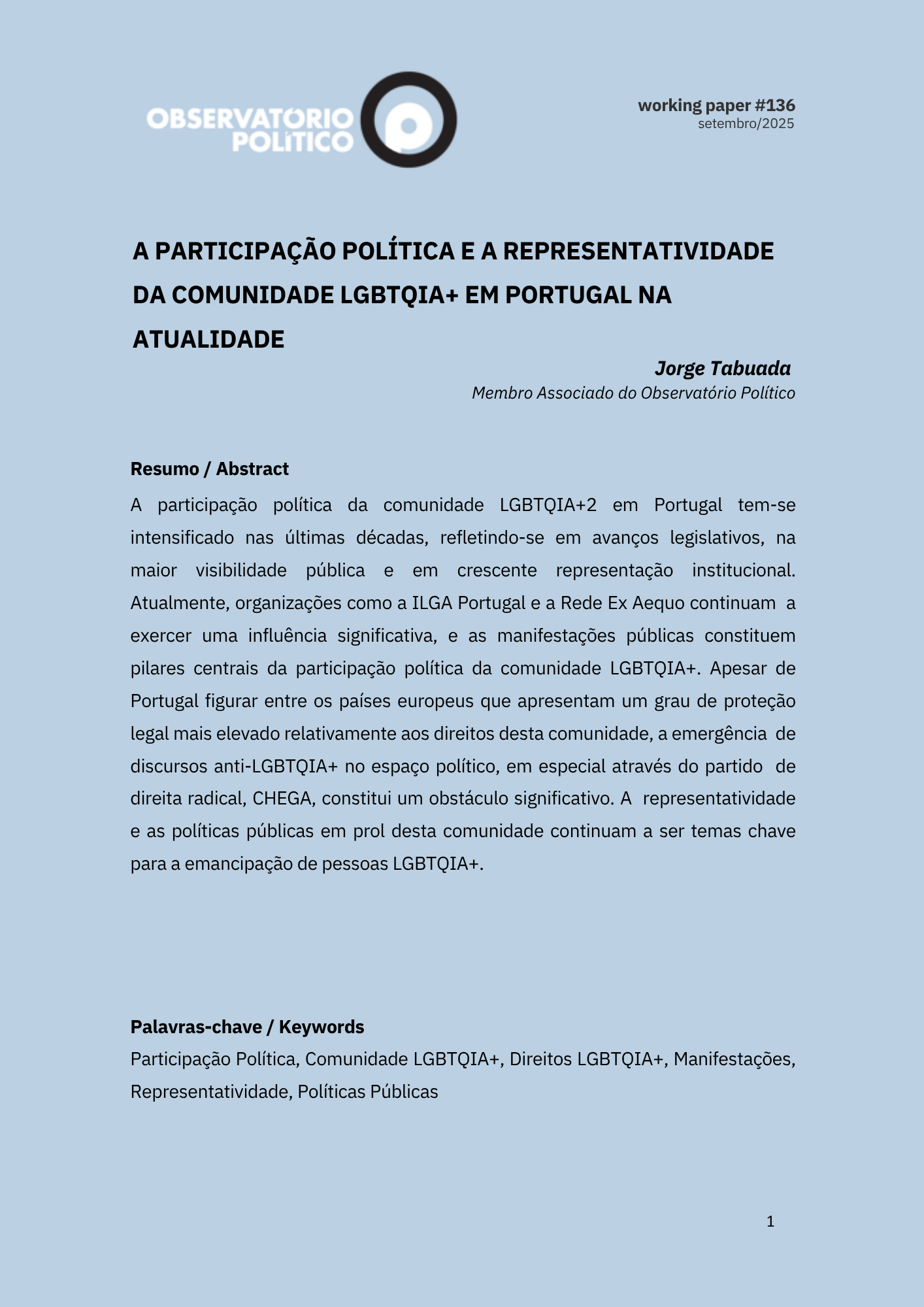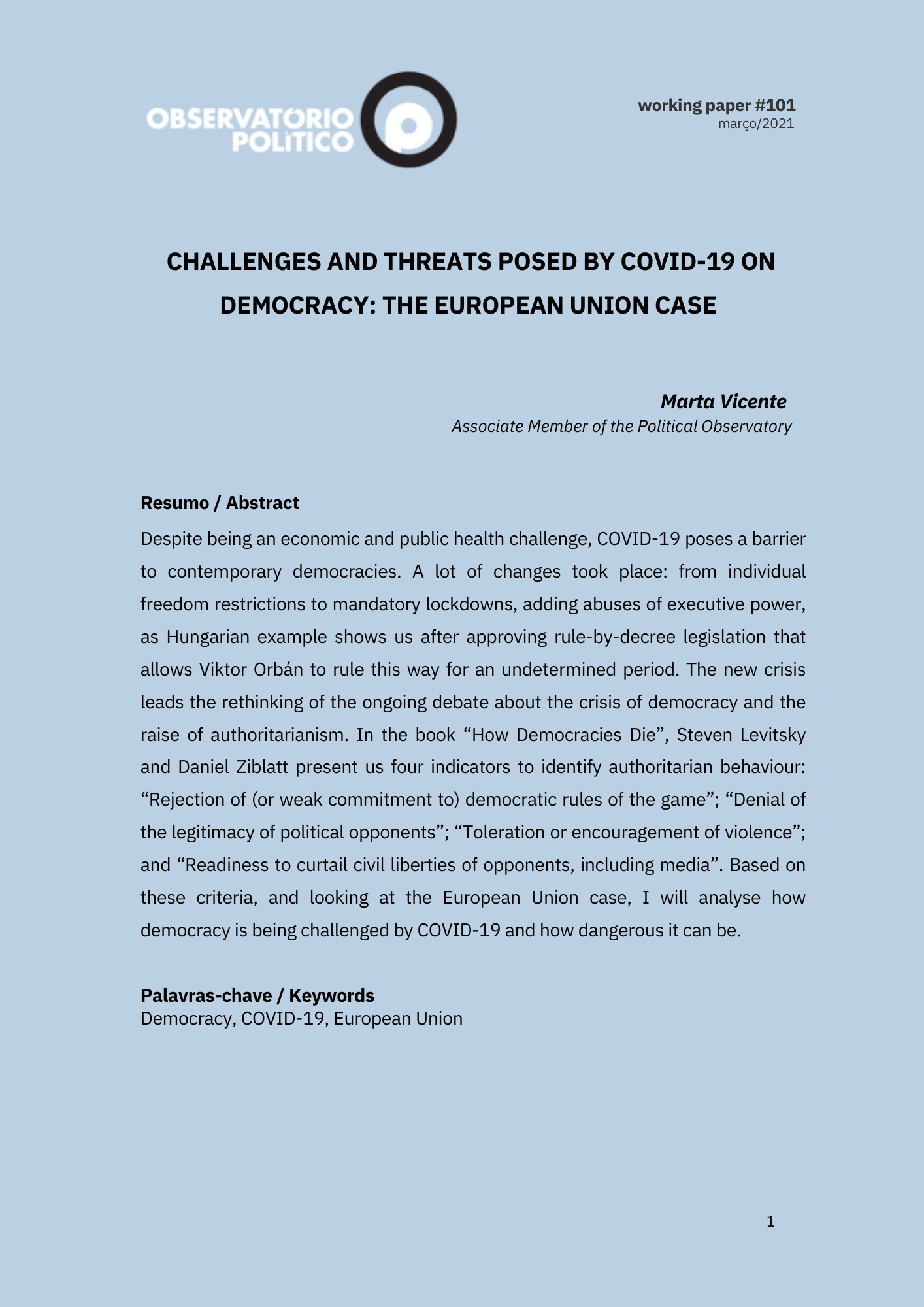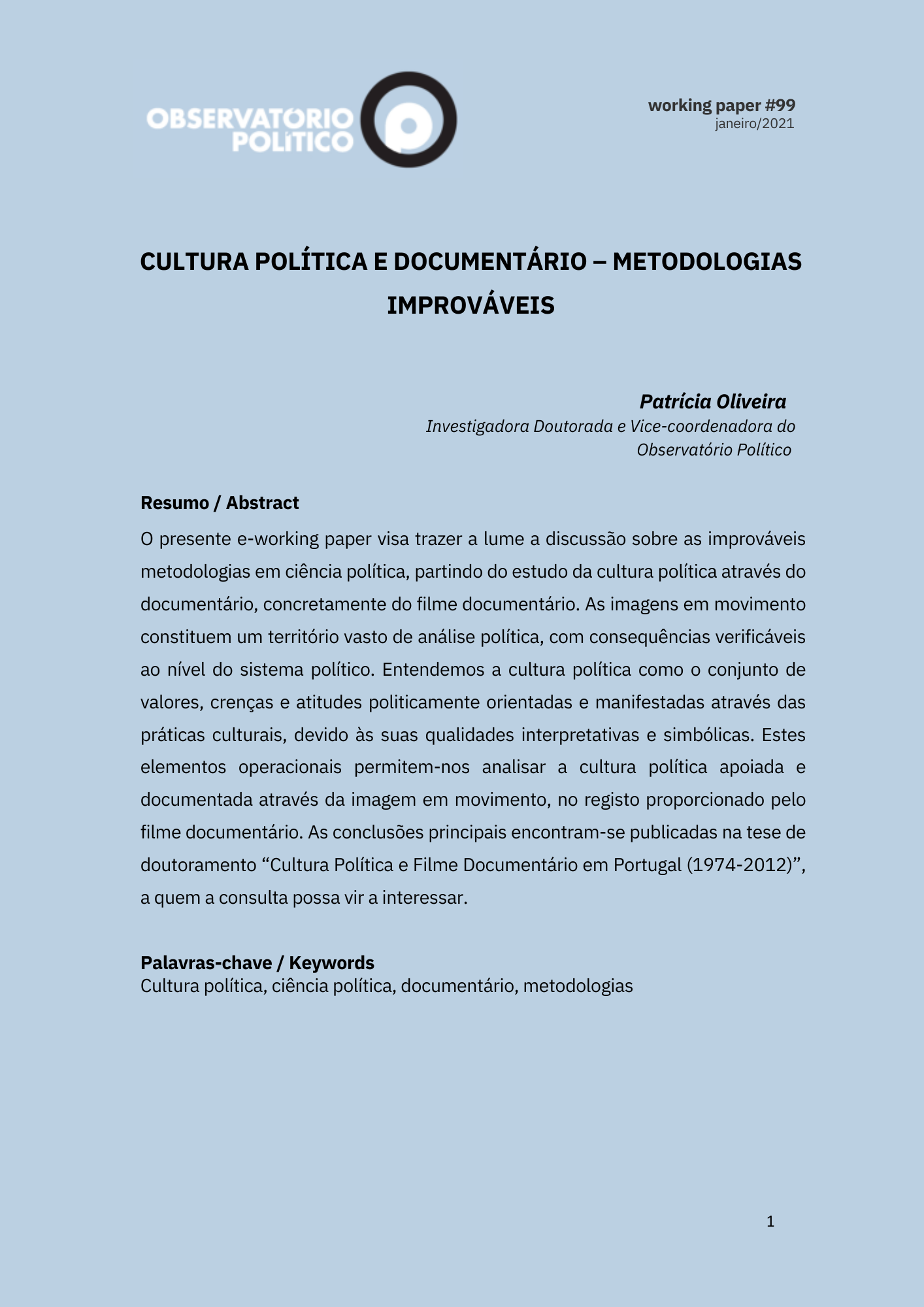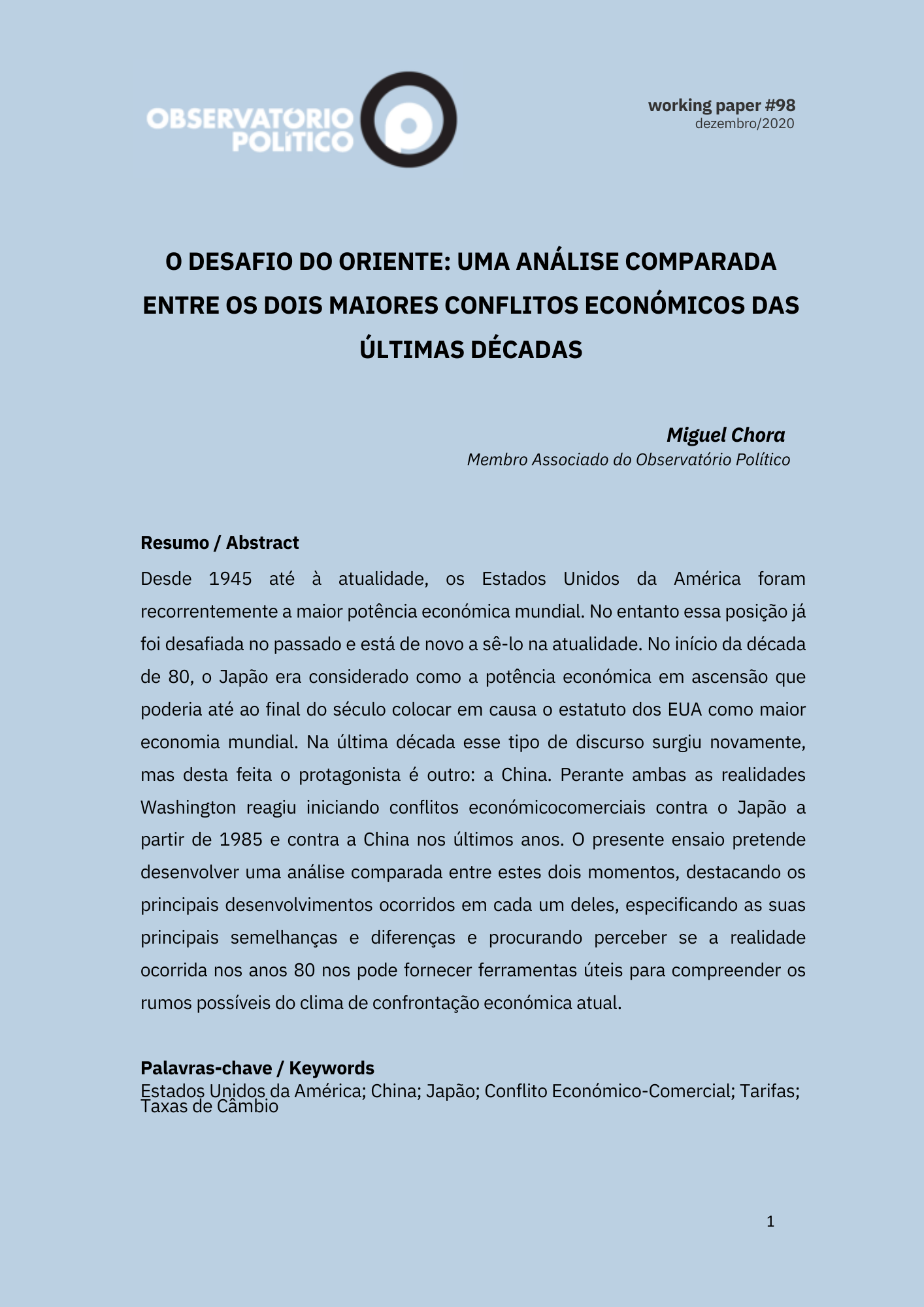The digital working papers (e-WP) began in early 2011, with the purpose of publishing electronic documents which result from research developed by the resident researchers and by the researchers who collaborate with the Observatory as associate members. A working paper can be a text based in theoretical reflexion, in methodological discussion or the presentation of empirical results. These texts are essentially works in progress, being the result of research conducted in the area of Political Studies. The texts proposed for publication are reviewed by the Editorial Council, in order to guarantee the standards of quality and scientific relevance of the works produced by the Political Observatory. To have access to the Working Papers, click on the corresponding image.
The published working paper list is available here.
Featured
Gabriel Pires Dias
The Kingdom of Saudi Arabia: the guardian of the status quo in the Middle East
Gonçalo Farinha
Iraq War, NATO Rupture and the New Threat to Multilateralism with Trump
Jorge Tabuada
Political participation and representation of the LGBTQIA+ community in Portugal today
2026
THE KINGDOM OF SAUDI ARABIA: THE GUARDIAN OF THE STATUS QUO IN THE MIDDLE EAST
Gabriel Pires Dias | WORKING PAPER #138
This paper addresses the foreign policy of the Kingdom of Saudi Arabia in the Middle East as a regional status quo power, seeking to answer the question: to what extent has Saudi Arabia asserted itself as a status quo power in the Middle East? Using a classical realist framework inspired by the thinking of Hans Morgenthau, the paper argues that Saudi Arabia, since its foundation as a state, has been asserting itself as the guardian of regional order in the Middle East. This is illustrated by first analysing the foundations of Saudi Arabia’s national identity and then the kingdom as a bastion of the status quo in the face of Egypt’s revisionism during the Arab Cold War and Iran’s revisionism since the Islamic Revolution. This is followed by a reflection on whether the nature of Saudi actions since 2015 can be classified as revisionist in tendency, before brief final considerations are made.
2025
IRAQ WAR, NATO RUPTURE AND THE NEW THREAT TO MULTILATERALISM WITH TRUMP
Gonçalo Farinha | WORKING PAPER #137
In 2003, the United States of America decided to act on their own and invade Iraq, despite the enormous disagreement within NATO regarding the American invasion of Iraq. This action by the American government gave rise to tensions within the organization, contributing to the weakening of relations between the Atlantic partners, especially between the Americans and the vast majority of the European allies who never hid their discontent with the American invasion of Iraq. This work aims to analyze how the invasion of Iraq influenced and determined the relations between NATO allies, as well as the perspectives and approaches of the United States and European allies, respectively, to this act of war, and to relate what was the beginning of a unilateral foreign policy on the part of Washington with the current Trump administration, which is also inspired by this type of approach.
POLITICAL PARTICIPATION AND REPRESENTATION OF THE LGBTQIA+ COMMUNITY IN PORTUGAL TODAY
Jorge Tabuada | WORKING PAPER #136
The political participation of the LGBTQIA+ community in Portugal has intensified in recent decades, reflected in legislative advances, greater public visibility, and growing institutional representation. Currently, organizations such as ILGA Portugal and Rede Ex Aequo continue to exert significant influence, and public demonstrations are central pillars of the LGBTQIA+ community’s political participation. Although Portugal is among the European countries with the highest level of legal protection for the rights of this community, the emergence of anti-LGBTQIA+ rhetoric in the political arena, particularly through the radical right-wing party CHEGA, is a significant obstacle. Representation and public policies in favor of this community remain key issues for the emancipation of LGBTQIA+ people. The political participation of this social minority is a form of resistance, but it faces the need to strengthen mechanisms of protection against possible setbacks.
HEGEL AND THE EVOLUTION OF GERMAN IDEALISM: A CONTRIBUTION TO UNDERSTANDING THE WORK AND THOUGHT
Daniela Barreiros Alves | WORKING PAPER #135
The present work serves as an analysis and understanding of George Wilhelm Friedrich Hegel’s thought. This analysis will have as its starting point the philosophical anthology of the author, simultaneously with the interpretation of predecessors and contemporaries who add to his legacy. Based on a life, work and thought trilogy, in order to bring together the central axes on which his colossal work deals, on the allied insertion of Philosophy, supported by Political Theory and understood by Contemporary Political Thought.
Sustainability 4.0: Progress or Illusion?
Helena Batalha | WORKING PAPER #134
The 2030 Agenda of the United Nations (UN) was adopted by all Member States with the aim of mobilizing global efforts around 17 Sustainable Development Goals (SDGs). In the current context, digital transformation represents a strategic ally in achieving these goals, particularly in the areas of social inclusion, environmental preservation, and economic growth. Today, we are living in a new technological era, marked by the prominence of artificial intelligence, big data, blockchain, and the Internet of Things (IoT) as technological means to ensure effective resource management, optimize the actions of national and international governments, and, at the same time, provide greater access to essential services. This paper aims to analyze the contribution of digital transformation to the achievement of the SDGs, assessing both the benefits and the challenges faced by any project that aspires to create a fairer, more sustainable, and more equitable world.
The Foucauldian Method and its Role in the Construction of Truth
Tomás Correia | WORKING PAPER #133
The Foucauldian approach to epistemology rejects absolute truths and emphasizes the contingent construction of knowledge. Unlike classical structuralism, which views phenomena as subordinate to fixed structures, Foucault proposed a genealogical approach to analyze discourses, practices, and power relations. Knowledge is not neutral, but shaped by mechanisms of power that influence its legitimacy. Foucauldian genealogy, inspired by the works of Nietzsche, seeks to uncover how different historical narratives are constructed and how they sustain socioculturally accepted truths. In this sense, truth is a dynamic and discursive process, subject to disputes and reconfigurations. Foucault’s concept of “dispositif” highlights the interconnection between discourses, institutions, and social practices. Genealogical analysis aims to deconstruct dominant narratives, promoting a critical view of knowledge and science. Consequently, the Foucaultian method does not merely seek to explain historical events, but to reveal the processes that shaped them and the alternatives that could have been pursued.
CONSTITUTIONALIZATION AS A DUAL OPERATION
Fernando Mendonça Costa and Kamile Moreira Castro | WORKING PAPER #132
The Brazilian Constitutions of 1967 and 1988 mark distinct historical moments and reflect varied perspectives on the interaction between the legal and political domains, two intrinsically linked and multifaceted dimensions. Law, as an essential tool for regulating political activities, and politics, as a driving force in the creation and application of Law, exemplify the complexity of this relationship. This paper proposes to conduct a comparative analysis of these two constitutions, focusing on the dual operation — legal and political — as a process of constitutionalization. We conclude that this operation is biunivocal, intertwining and feeding back into a complex process of constitutionalization. For this purpose, a structural method of historical and functional analysis of the Brazilian Constitutions was adopted, which involves a systematic comparison through the construction of an informative and descriptive database, aiming to identify similarities, differences, and patterns.
BELT AND ROAD INITIATIVE AND THE CONNECTION WITH THE HORN OF AFRICA: THE CASE OF DJIBOUTI
Carina Fernandes | WORKING PAPER #131
This article explores the People’s Republic of China’s interest in broadening its policy of cooperation and aid with Africa, which in itself is a constitutive factor of China’s foreign policy and identity. Through the Silk Road, the People’s Republic of China aims to regain leadership in the international order and to this end Djibouti, which was relevant due to its strategic positioning in the Horn of Africa, is part of China’s strategy to extend its geopolitical corridor. Djibouti is home to China’s first ultra-maritime military base, and it is also one of the crucial points in the railway network project linking the entire East African region. And it is precisely in this African region, where the connection between the economic and military components is to be seen, that the People’s Republic of China considers to be a major contributor to the Belt and Road Initiative’s functioning.
POLITICAL OBSERVATORY'S ITINERARIES | 15TH ANNIVERSARY MANIFESTO
Cristina Montalvão Sarmento | WORKING PAPER #130
In 2024, the Political Observatory celebrated its 15th anniversary since its foundation in 2009. In this working paper, as a member of the Board, we evaluate the production that tends to form a political process and a type of configuration, as it occurs throughout all institutions. The changes that have taken place, or the more substantial changes that are inherent to the association, whether internal or imposed on it from outside, are recorded here. The synthesis and evaluation of the Political Observatory’s itineraries in a manifesto for action will be facilitated by an assessment of the written culture, a visit to the association’s premises and an evaluation of its network.
2024
HOW PPV/CDC FUSED WITH AND INFUSED CHEGA
Carolina Querido | WORKING PAPER #129
Known for having a stable party system, Portugal was late to the new far-right populist wave that has spread around the world. In 2019, the first Chega MP entered the Portuguese Parliament, marking the first success for this side of the political spectrum since the Revolution of 1974. In fact, Chega is not the first, instead being the first to leave behind the marginal results at the ballot box. Starting by looking at PPV/CDC, then to Chega and finally to the undeniable links that allowed a fruitful merger, this working paper aims at understanding how this electorally irrelevant party has been influential to what Chega is, taking note of how their main anti-abortion platform can play a role in the future, by asking: “how did PPV/CDC fused with and infused Chega?”
THE PHENOMENON OF IBERIAN EXCEPTIONALISM AND ITS RECENT DOWNFALL
Joana Silva | WORKING PAPER #128
Iberian Exceptionalism is a term used to explain the fact that Portugal and Spain were immune to right-wing parties in their national governments after the 1970s. This Exceptionalism is no longer applicable to both countries with the recent rise of populist political parties right-wing radicals. This article aims to explore and answer the question of how and why Iberian Exceptionalism ended in Spain and Portugal and furthermore, it aims to explore the role of the European Union in the rise of these parties and how European Union policies may have contributed to their end.
THE WOKE MOVEMENT, A CORSET TO ARTISTIC AND CULTURAL EXPRESSION
Duarte Perdigão | WORKING PAPER #127
This article presents an analysis of the emergence and implementation of the woke movement in contemporary societies and how this movement has proven to be a “straitjacket” for artistic and cultural creation.
The woke movement emerged with the aim of protecting various social groups, which, according to the movement, must be defended from anything that could be interpreted as offensive, including art and culture. This defense has taken on considerable proportions through the so-called “cancel culture.”
Thus, this article explores the threats posed by the woke movement to artistic and cultural freedom, analyzing the movement’s evolution from its inception to the present day, examining the changes in its goals, and how it has transformed society.
THE RUSSIAN-UKRANIAN GAS WARS OF THE 1990s
Pedro Henriques | WORKING PAPER #126
This article will focus on the foreign policy of the Russian Federation in the energy field, in particular the commercial relations established with Ukraine, from the end of the USSR until 1994, the year of the relative stabilisation of the conflicts, which would resurface at the turn of the century. By analysing the ties of interdependence between the two states, followed by a description of the moments of confrontation over natural gas, this article will explore and debate the reasons behind the ‘gas wars’ of the 1990s between the Russian Federation and Ukraine.
POLYGRAPH: TRUTH AS A POLITICAL CONDIMENT
Orlando Coutinho | WORKING PAPER #125
Truth is a fundamental attribute in the political phenomenon as a whole. What the “actors” do with it results in an evaluation – not always decisive, but relevant – by the “spectator” who, in democratic regimes, has – to a certain extent – primacy when it comes to making choices. But does truth have the same weight, dimension and solemnity for all the actors involved in politics? The argument I’m going to develop is that it doesn’t. For a philosopher, the search for truth is unquestionable; for a journalist, the truth is fundamental; for a politician, the truth is important; for the citizen, the truth is necessary, but only just. In order to support this reasoning, I will try to rehearse a concept of truth from an epistemological, ontological and gnosiological point of view, attempting to establish a correlation between “demanding” philosophy and the “plasticity” immanent in political activity.
THE NEW SILK ROAD AND ITS RELATIONSHIP WITH THE EUROPEAN UNION
Tomás Almeida | WORKING PAPER #124
This working paper focuses on the relationship between China’s megaproject, the New Silk Road, and its relationship with the European Union. The working paper explains what the New Silk Road is, its history, China’s main objectives, as well as the main land and sea routes. All this contributes to a good understanding of how the New Silk Road could change the paradigm within the European Union. Within the European Union, I can see the countries that have signed a memorandum with the People’s Republic of China so that this endeavor can become part of national policy. Finally, it is also possible to look at all the EU member states that have actually signed an agreement and what investment China has made in the country.
PORTUGAL'S PARTICIPATION IN INTERNATIONAL MISSIONS AS AN AXIS OF FOREIGN POLICY
Sara Cruz | WORKING PAPER #123
From a very early stage, one of the most important axes of Portuguese foreign policy has been the guarantee of security and defense at national and international level. In this sense, throughout history, the military vector has helped Portugal to assert itself in the three main axes of its Foreign Policy (Atlantic, African and European) and to achieve certain goals of self-determination and affirmation in the Iberian space, as well as establishing alliances and participating in international organizations, thus strengthening its external relations with the international community.
2023
THE RADICALISM OF THE NEW CLIMATE MOVEMENTS IN PORTUGAL: THE CASE OF THE CLIMÁXIMO ACTIVIST GROUP
Gonçalo Timula | WORKING PAPER #122
The problem of “climate change” is not something new that only emerged in the 21st century. With the Industrial Revolution and the effects of greenhouse gas emissions, the concept of “climate change” began to be widely addressed and discussed by scientists, political leaders and media professionals. With the birth of the first climate movements such as the Greenpeace organization in the 1970s, this issue took on a new dimension as people began to become aware of the catastrophic effects caused by climate change, which consequently led to several peaceful protests.
CONSERVATISM AND RACIAL IDENTITARIANISM: AN ANALYSIS OF CONVERGENCES IN OPPOSITION TO INDIVIDUALISM
Sofia Muñoz | WORKING PAPER #121
This essay proposes a critical analysis of the convergences and divergences between national conservatism and racial identitarianism, with an emphasis on their relationship with individualism and liberalism. The investigation will focus on how these ideological currents, often considered distinct, can share areas of convergence by challenging fundamental assumptions of individualist and liberal thinking present in modern democratic societies, offering insights into current debates about the nature and limits of plurality in democratic societies.
THE UNRAVELLING OF POWER WITHIN POLITICAL PARTIES: LEGITIMACY AND TRUST
José Nascimento | WORKING PAPER #120
Considering the quality of democracy as one of the most relevant contemporary themes in the study of political science, the present working paper addresses this topic, basing its analysis on the work “The quality of democracy: the citizens’ vision”. The role of participation by the citizens is debated as a predictor of the level of quality of democracy in Portugal, acknowledging factors such as political discourse and practice. Thus, the author goes beyond the analysis on the theoretical field, considering operational aspects deemed relevant in the evaluation of quality in democracies.
ETHICS IN DECIDING PUBLIC LIFE
Daniela Barreiros Alves | WORKING PAPER #119
The acts of decision sustained in the political being are first and foremost human acts, the demonstrable repercussion of rational attitudes anchored in values and ideas, as the first stage of the entire social project. The categorization of values and actions has been placed on the spectrum of classification in order to decide what is or isn’t correct, because what isn’t is unlikely to be legitimized in the socio-political sphere. Between Law and Political Science there is a space that allows for the extraction of the collision of ethical-normative justifications that propose direct intervention in political decision-making. In Political Studies, attention to ethics has been predominant in the projection of political action, strategy and the resolution of conflicts caused by the subversion of values in public life.
AN INTRODUCTION TO CHINA’S RATIONALE BEHIND THE 16+1 INITIATIVE: A PLURALISTIC APPROACH
Patrícia Raposo | WORKING PAPER #118
Since the earlier 2000s China has developed multilateral institutions with developing countries. In 2012 a new institution focusing on Eastern Europe was introduced: the China-CEEC Cooperation or the 16+1 Initiative. This cooperation posed as no novelty in the sense that it followed the ongoing Chinese foreign policy trend to create such mechanisms to improve relations with other countries. However, the 16+1 Initiative does have its own specifics. In this article I will outline the main Chinese motivations behind this Initiative to understand the rationale behind it, as well as a brief analysis on the topic with the help of the neorealist, neoliberal and constructivism theory of IR.
GOD, COUNTRY AND FAMILY: ANALYSING THE POLITICAL PROPAGANDA OF ANTÓNIO SALAZAR AND JAIR BOLSONARO
Vinícius Barbosa Albernaz | WORKING PAPER #117
This work seeks to analyze the doctrine of God, Country and Family present in the political propaganda of politicians António Salazar and Jair Bolsonaro and their impact on Portuguese and Brazilian societies. The methodology used in this investigation is theoretical, exploratory research with a bibliographical review and the use of the comparative method between Salazarist propaganda and Bolsonaro propaganda. This work is divided into three main areas: 1 – political propaganda – key concepts, 2 – analysis of Salazarist political propaganda and 3 – analysis of Jair Bolsonaro’s political propaganda. At the end of the article, the central idea about the main points between the Salazarist doctrine/propaganda and the Bolsonaro doctrine/propaganda is presented.
2022
“NOVA LISBOA” AND THE REVOLUTIONS THAT ARE STILL NOT BEING TELEVISED
Madalena Mota | WORKING PAPER #116
This working paper seeks to analyze the rebranding processes of the cultural profile of Lisbon regarding the commodification of black culture. Through the work of Scholars that have analyzed the postcolonial practices of institutional cultural platforms, as well as the bottom-up creativity in marginalized neighborhoods of Lisbon, I will then present the case of a Cova da Moura based collective – Bazofo & Dentu Zona – that comes as an insurgent association, directly tackling structural issues related to ethnic citizenship, which the institutional cultural practices often fail to address. The argument is precisely to stress the relevance of collectives such as this one not only in resisting the commodification process, but also to act as agents of change in the socio-political panorama, given its positive identity affirmation and community empowering practices.
THE JIHADIST USE OF THE CYBER SPHERE: RADICALIZATION AND RECRUITMENT DYNAMICS
Margarida Malta | WORKING PAPER #115
The predominance of terrorism in the twenty-first century has become a primary concern for western societies and governments, as well as a dominant focal point for international organizations that ensure security among the world. The magnitude of this issue has led to an overwhelming amount of research about the different components of terrorism, including the dynamics of recruitment and radicalization into terrorist groups. These constitute the primary steps of the connection with the defense of the jihad, and there has been established a link between terrorism and the Internet, as terrorists have been known to use the cyber grounds to allure individuals into their beliefs and incite violence among them. Therefore, the present working paper will focus on the ways terrorism gains by way of the Internet, through the dynamics of online recruitment into terrorist groups and organizations and the processes of radicalization, while analyzing a vast variety of terrorist content online, in the format of propagandistic magazines or training manuals, among other aspects.
O ESPAÇO PÚBLICO PORTUGUÊS E A MEMÓRIA COLONIAL: AS HISTÓRIAS QUE AS RUAS NÃO CONTAM
Tomás Chasqueira | WORKING PAPER #114
Portugal’s (still very recent) colonial past remains recast in the shadows. Practically absent from the mainstream media debate and the political and institutional agenda, as it is largely ignored and undisputed, but present on the streets every day, largely due to the myriad of monuments and statues that glorify it. It is urgent that we face up to it, as the Council of Europe’s Commissioner for Human Rights has recommended. This literature review aims to synthesize and reorganize what the bibliographical sources read for this Working Paper establish about the political aspect of monuments and memorial landscapes, especially those that refer to Portugal’s colonial past.
UM NOVO OLHAR SOBRE O CONSERVADORISMO
Pedro Afonso Pedrosa dos Santos | WORKING PAPER #113
In the public space, there is a great deal of confusion about the meaning of the term “conservativism”, which is used pejoratively or interchangeably with the concepts of “right-wing” or “reactionary”. Commonly, conservativism is associated with the defense of the status quo and, therefore, with doldrums – which implies the rejection of change. This working paper seeks to clarify the definition of conservativism so that the term can be used more correctly by the reader. As such, the relationship between conservativism and change is addressed, essential to understanding its meaning and capturing its paradox. The key argument is that conservativism is best understood in adjectival terms, so it is necessary to contextualize it temporally and spatially in order to access its true content.
REFORM OF THE UNITED NATIONS SECURITY COUNCIL
Constança Torcato Reis | WORKING PAPER #112
The plan to reform the UN Security Council has been on the United Nations agenda for several decades, yet without any visible progress. Considering it is the main UN body, in charge of maintaining international peace and security, it must be reformed in order to correct serious flaws in its functioning. Thus, this working paper defends the reform of the Security Council in a way that ensures adequate regional representation, in order to reflect the realities of the 21st century, and enhances the transparency of the decision-making process, with the aim to improve the legitimacy of its decisions and the credibility of the Security Council.
A NOVA ONDA AUTOCRÁTICA: UMA ANÁLISE TEÓRICA
João Santos | WORKING PAPER #111
In contrast to what Francis Fukuyama stated, the world has not witnessed the universalization of the western democratic regime. On the contrary, since the last years of the 20th century, the globe has been plagued by a new wave of autocracy, the Third. In this context, the present Working Paper aims to address the new autocratic wave, with a view to identifying its emergence, its characterization, and its historical precedents, as well as analyzing the modes of action under which it has been operating.
A ASCENSÃO DA EXTREMA-DIREITA NA EUROPA: UMA AMEAÇA À DEMOCRACIA
Margarida Rosa | WORKING PAPER #110
In an era prone to extremism, a look is projected on the extreme right as a threat to democracies and a force that intends to triumph. This working paper seeks to analyze the return of these policies to the center of the discussion, given that there are already several countries where extremist and radical orientations have been gaining relevant positions, or governing, and whose strength is not limited solely to national parliaments. Will the future dictate the effective rise of the far right as a viable option or its decline as a destabilizing option?
2021
A INFLUÊNCIA NORTE-AMERICANA NA IDENTIDADE AÇORIANA
Maria da Luz Riley | WORKING PAPER #109
With Portugal’s entry into the European Union, we have progressively come to focus on this sphere of influence, although for many years the United States has been the focal relation for the Portuguese. This working paper seeks to reflect on the relationship between the Azores and the US, analyzing its history from the 18th to the 21st century, characterized by a strong bilateral affinity, as well as how it has shaped Portuguese culture, national and foreign policy.
REFLEXÃO TEÓRICA DO ESTUDO SOBRE A QUALIDADE DA DEMOCRACIA EM PORTUGAL: A VISÃO DOS CIDADÃOS
Vinicius Barbosa Albernaz | WORKING PAPER #108
Considering the quality of democracy as one of the most relevant contemporary themes in the study of political science, the present working paper addresses this topic, basing its analysis on the work “The quality of democracy: the citizens’ vision”. The role of participation by the citizens is debated as a predictor of the level of quality of democracy in Portugal, acknowledging factors such as political discourse and practice. Thus, the author goes beyond the analysis on the theoretical field, considering operational aspects deemed relevant in the evaluation of quality in democracies.
ENERGIA E SUSTENTABILIDADE: DESAFIOS E OPORTUNIDADES DA TRANSIÇÃO ENERGÉTICA NO MÉDIO ORIENTE E NORTE DE ÁFRICA
Miguel Pereira | WORKING PAPER #107
This working paper aims to analyze the opportunities and challenges arising from the current energy transition in the Middle East. This transition presents a set of political, economic, and environmental challenges, considering the new challenges in the scope of international economics and energy issues. In these sense, this paper focus on the United Arab Emirates and Saudi Arabia, two countries that have been central to the development of renewable energy projects and to a more comprehensive economic transition and diversification.
CHINA AND THE INSTITUTION OF SOVEREIGNTY
Diogo Machado | WORKING PAPER #106
In the International Relations literature there is a division between those who claim that China is a staunch defender of a rigid conception of sovereignty and between those who argue that such defence is instrumental and conditional on Chinese interests. In this context, this workin paper seeks to describe the relation between China and sovereignty by analysing multiple empirical instances of Beijing’s engagement with this major institution of international society.
OS CONFLITOS RELIGIOSOS E POLÍTICOS NA CHINA: AS DIFICULDADES DE UMA SUPERPOTÊNCIA EM REPUTAR OS DIREITOS HUMANOS
Tatiana Baleia | WORKING PAPER #105
China has recently been contemplating the use of multilateralism in its geopolitical and trade strategies. Taking the lead in the race for world superpowers, the People’s Republic of China has focused on developing relations with several countries as part of its economic plan. However, in the social area, particularly the Human Rights have required an intervention on behalf of the International Community. This working paper intends to relate the Chinese historical past with religious and political conflicts, to approach what is happening in Hong Kong, Taiwan and Xinjiang, and also to understand the attitudes of the International Community in the scope of Human Rights.
O PAPEL DO ESTADO PÓS COVID-19 NO CONTEXTO DA AMÉRICA LATINA
Nathaly Calixto | WORKING PAPER #104
Latin-American countries are trying to create supporting measures to ease the negative effects of the current pandemic. Given the new character of the COVID-19 disease, there are several discussions regarding the performance of governments. The pandemic has brought to the surface the difficulties already felt by the populations. Therefore, this working paper approaches some of these complex issues, by analysing the role of liberalism in current crises, the measures applied by the countries of Latin America, as well as their economic integration and the challenges they are facing.
DA REVOLUÇÃO BEHAVIORISTA AO CONTRIBUTO DE DAVID EASTON: BREVE ENSAIO EPISTÊMICO-BIOGRÁFICO
Adriano Othon | WORKING PAPER #103
The present working paper examines the emergence of the behaviorist approach of political science – in the second half of the XX century – and its primary attributes, focusing on the life and work of David Easton. This work is predominantly theoretical-descriptive, adopting a qualitative approach. The relevance of the essay is based on a scientific nature, providing a contextualized vision of the work of a political scientist that has developed theories, methods and concepts that are to this day problematized and updated by other political scientists. It notes, among other aspects, the elaboration of new theories and methodologies derived from the concept of political support by Easton – diffuse and specific support.
A DIREITA RADICAL POPULISTA EM PORTUGAL
Margarida Santana | WORKING PAPER #102
The new radical right phenomenon, which has haunted Europe since the 1970s, seemed to have no significant expression in Portugal. In the 2019 legislative elections this scenario changes, with the party Chega reaching 1.3% of the votes and obtaining representation in the national parliament. Therefore, this working paper analyses Chega from the perspective of Cas Mudde, focusing on its political culture and the conditions for its emergence.
Challenges and threats posed by Covid-19 on Democracy: European Union Case
Marta Vicente | WORKING PAPER #101
Despite being an economic and public health challenge, COVID-19 poses a barrier to contemporary democracies. A lot of changes took place: from individual freedom restrictions to mandatory lockdowns, adding abuses of executive power, as Hungarian example shows us after approving rule-by-decree legislation that allows Viktor Orbán to rule this way for an undetermined period. The new crisis leads the rethinking of the ongoing debate about the crisis of democracy and the raise of authoritarianism. Based on the book “How Democracies Die”, and the four indicators to identify authoritarian behavior presented by Steven Levitsky and Daniel Ziblatt, this paper analyses how democracy is being challenged by COVID-19 and how dangerous it can be.
ENCRUZILHADAS DA TEORIA POLÍTICA: UMA ABORDAGEM CONTEMPORÂNEA
Cristina Montalvão Sarmento | WORKING PAPER #100
The Political Observatory reached the notable number of 100 Working Papers published, a series that began in 2011 completes a decade. All of these working documents present different methodologies and different themes that correspond to the multiplicity of interests of its subscribers. Among the several topics addressed, directly and indirectly, the field that needs more contextual clarification, is that of political theory. This paper returns to the arguments developed by Drysek, Honing and Phillips, at the opening of the collective work Overview of Political Science (2011), in the classic The Oxford Handbook of Political Science, which aimed to answer the question What is Political Theory?, to place the scientific field, covering their crossroads.
CULTURA POLÍTICA E DOCUMENTÁRIO – METODOLOGIAS IMPROVÁVEIS
Patrícia Oliveira | WORKING PAPER #99
This e-working paper aims to bring to light the discussion about the unlikely methodologies in political science, starting from the study of political culture through documentary, specifically the documentary film. Moving images constitute a vast territory for political analysis, with verifiable consequences for the political system. We understand political culture as the set of values, beliefs and attitudes that are politically oriented and manifested through cultural practices, due to their interpretive and symbolic qualities. These operational elements allow us to analyse the political culture supported and documented through the moving image, in the register provided by the documentary film.
2020
O DESAFIO DO ORIENTE: UMA ANÁLISE COMPARADA ENTRE OS DOIS MAIORES CONFLITOS ECONÓMICOS DAS ÚLTIMAS DÉCADAS
Miguel Chora | WORKING PAPER #98
The US is the biggest economic power since 1945. Nonetheless this position was called into question in two different moments during recent history. In the 1980’s by the emergence of Japan and nowadays by China. This essay aims to develop a comparative analysis between these two moments, highlighting the main developments in each one of them, specifying their main similarities and differences and trying to understand whether the reality that occurred in the 1980s can provide us with useful tools to understand today’s economic confrontation.
LENIN ON CIVIL WAR: CLASS STRUGGLE AND REVOLUTION AS INSTANCES OF CIVIL WAR
Tomás Correia | WORKING PAPER #97
Civil war is a quite recurrent theme in several academic disciplines, from Political Science to Philosophy. The war of “brother against brother” has filled the imaginary of both academics and the general public, as it manifested itself as a recurrent and relatively common phenomenon. In this essay, it´s proposed a genealogical study of Lenin’s concept of revolution as an instance of civil war, with a special focus on the relationship between Lenin’s thought and the Russian Revolutions of 1905 and 1917.
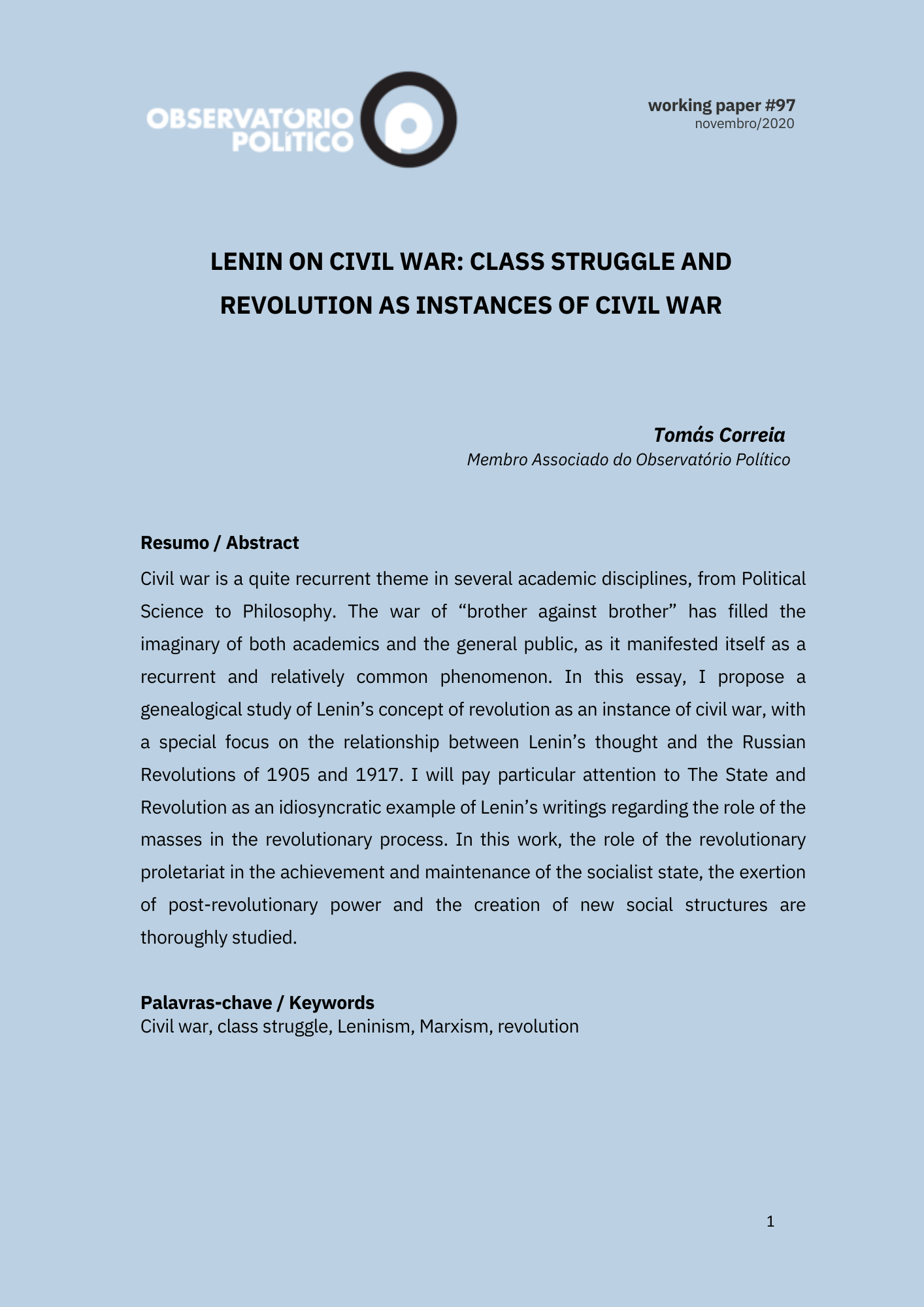
FOREIGN POLICY BETWEEN PORTUGAL AND FINLAND (1917- 1994)
Luís Sargento Freitas | WORKING PAPER #96
This article analyses the diplomatic ties and foreign policies between Portugal and Finland in the period 1917 -1994. It is based on extensive research involving hundreds of documents and, after a careful selection, only those considered relevant to the issues in question have been included. The importance of most of these documents for an interdisciplinary study had never been subject of academic debate. Bringing them to light will enable us to better understand the state of academic research in foreign policy (particularly between Portugal and Finland) as well as its connection with European diplomatic history (from 1917 to 1994), political science and international relations.
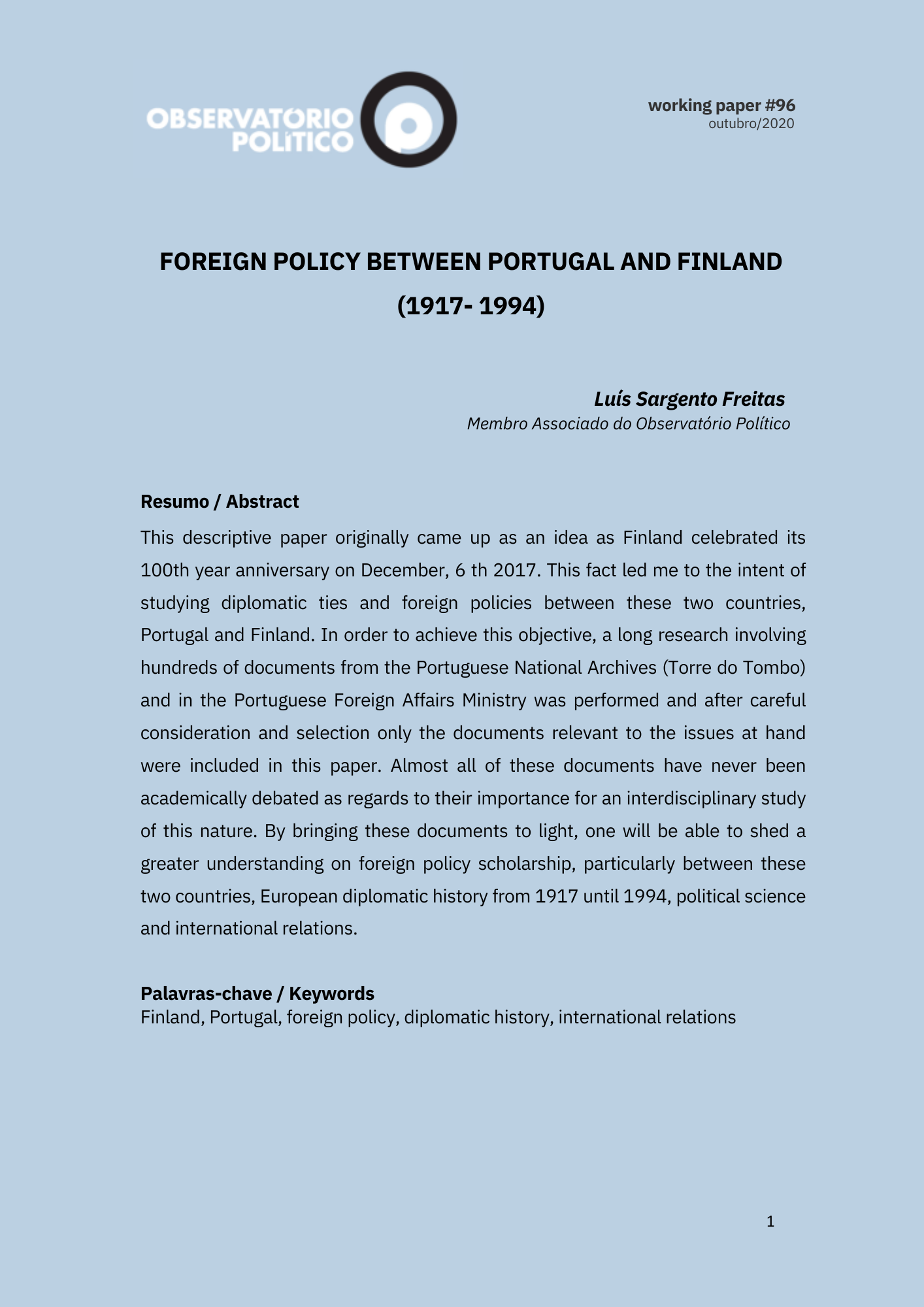
ESTADO DE ARTE DA GUERRA CIVIL FEMINISTA
Susana Garcia | WORKING PAPER #95
Feminism – as a theoretical school and movement – presents quite pronounced internal divides, based on different constructions of the social role of women. This working paper is inspired by the contribution of the sociologist and feminist Camille Paglia in “Free Women, Free Men”, which analyzes the historical evolution of the feminist movement and its consequences for the interpretation of women, who are heirs of concepts contrary to the social contract , addressing the resulting social repercussions.
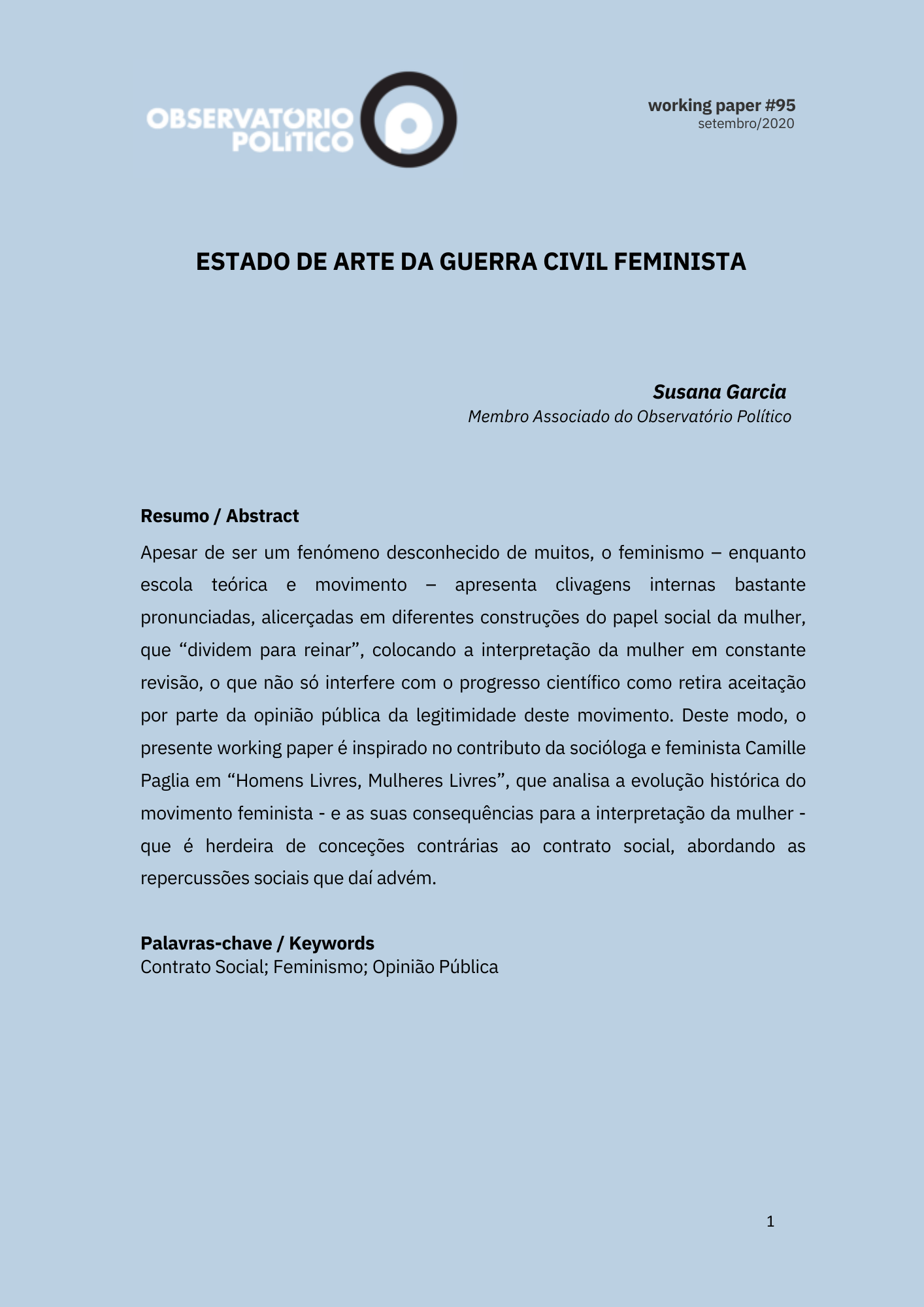
A ESCALADA DE ERDOĞAN AO PODER ABSOLUTO NA TURQUIA
Diogo Moreira | WORKING PAPER #94
During the last century, the creation and transformation of the Turkish regime has undergone distinct developments and taken several directions of action in political, religious, or social terms. More recently, the creation of the AKP in 2001 and the rise to power of the current President and former Prime Minister of Turkey, Recep Tayyip Erdoğan, has been restructuring the Turkish domestic policy through a nationalist and populist path. In this working paper, will be outlined the Erdoğan’s path to absolute power in Turkey, focusing on the main instruments and main events that legitimized the power of the President of Turkey, disrupting with the Kemalist regime under which Turkey has been historically governed.

A PROMOÇÃO DA IDENTIDADE EUROPEIA SOB A PERSPECTIVA DO PROGRAMA ERASMUS +
Ana Rita Dias | WORKING PAPER #93
The European Commission presents the Erasmus + Programme as one of the flagship initiatives for the growth of the European Union and for the promotion of the european integration.Through the application of a questionnaire to higher education students between the years 2014 and 2020, the purpose of this working paper is to observe the impact of student mobility as an enhancer of european integration, more specifically to understand the impact of the Erasmus + Program on european identity.

LÍDERES POPULISTAS E A CRISE DO CORONAVÍRUS: COMPARAÇÕES ENTRE ESTADOS UNIDOS E BRASIL
Andressa Costa e Ana Bernardi | WORKING PAPER #92
The coronavirus pandemic has sudden and fast emerged, bringing new challenges in a global scale. Brazil and United States are two countries with most cases and deaths by Covid-19 in the world. This paper aims to analyze the political options taken by the populist leaders of Brazil and the United States, evaluating the impacts on the respective societies. Preliminary results point as a core consequence the intensification of polarization in the countries, which manifests on society through several aspects, such as disbelief in the seriousness of the epidemy, distrust in information from the media, and different attitudes regarding the contention measures.
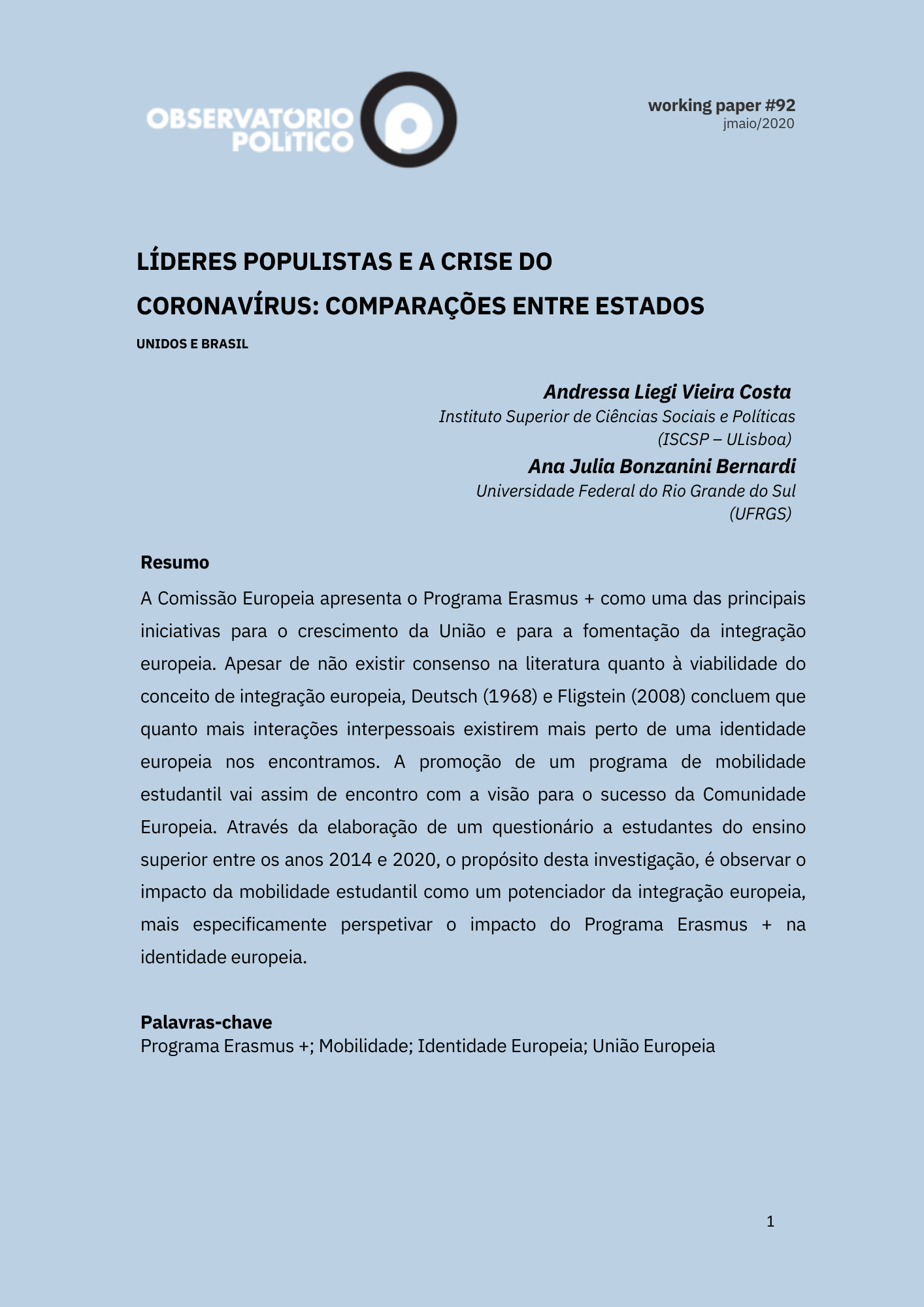
A DESINTEGRAÇÃO DA COMUNIDADE MUÇULMANA NA EUROPA COMO CAMINHO PARA O TERRORISMO ENDÓGENO
Diogo Nascimento | WORKING PAPER #91
Over the past few decades, the European continent has been faced with a growing wave of immigration from countries with Muslim majority, thus contributing to an increasing extension of the Muslim diaspora. However, despite the welcome that these Muslim migrants have received from Europe, they, especially those of the second and third generation, tend not to integrate into European societies. This integration difficulty has led many of these young Muslims to become radicalized and, later, to commit terrorist attacks of Islamist nature. Therefore, it is necessary reflect on this subject and question if the enormous demographic weight of the Muslim community in Europe results in a loss of European identity, as well as a security problem.
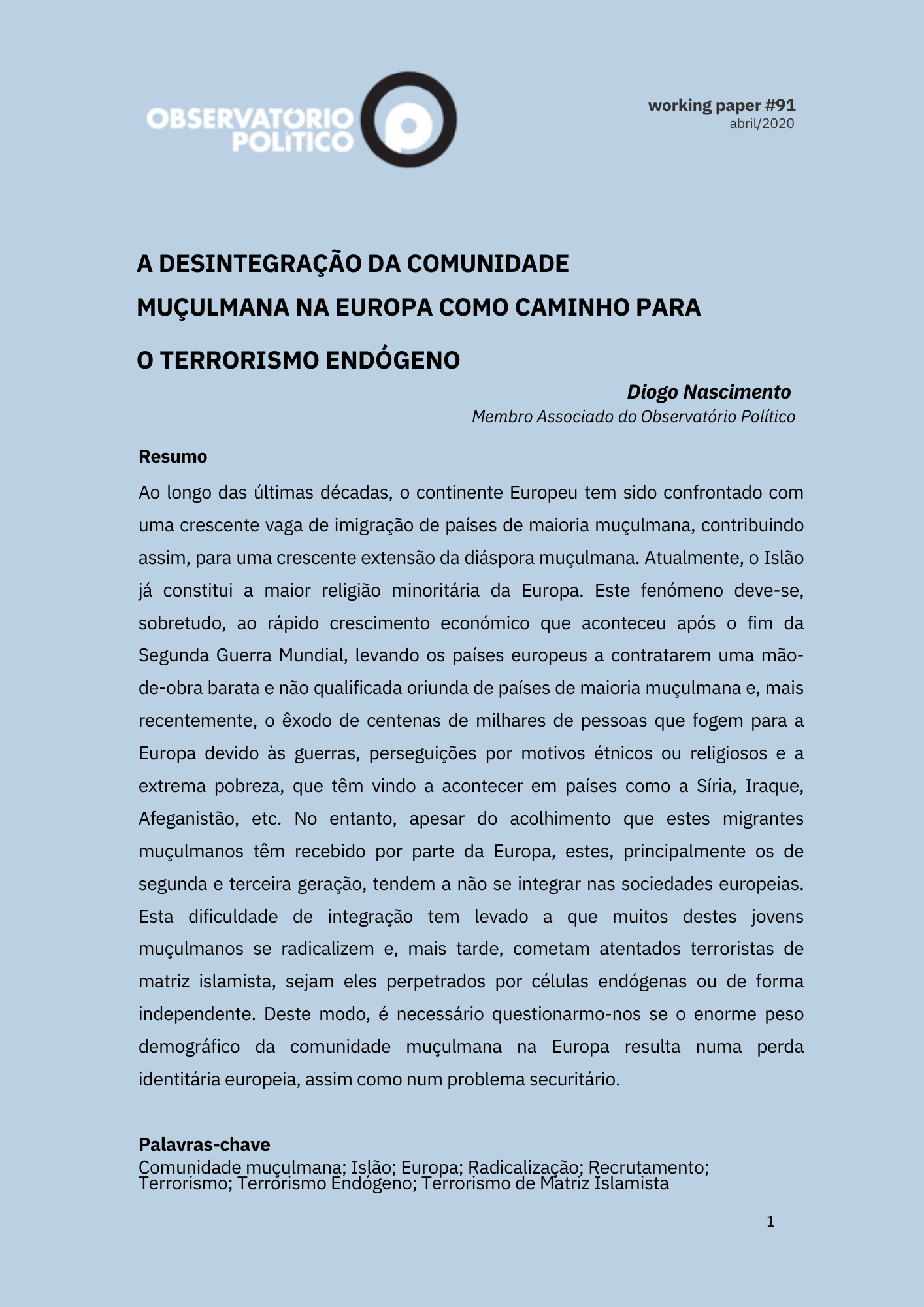
SOCIAL CONSTRUCTIONISM, POWER AND BEHAVIOUR: A POST-STRUCTURALIST ANALYSIS
Tomás Correia | WORKING PAPER #90
Human nature has always been a hot topic of discussion in the literature of Political Philosophy, with the dialectical relation between agent and structure occupying an important part of the debate since the dawn of structuralism in the 1960’s. This working paper argues that a normative type of behaviour is mainly socially constructed and that the features inherent to human nature, according to the essentialist tradition, have little to no impact on how behaviour and decision-making occurs. Thus, this paper discuss the important role of social constructionism and post-structuralism on the ongoing debate in the literature.
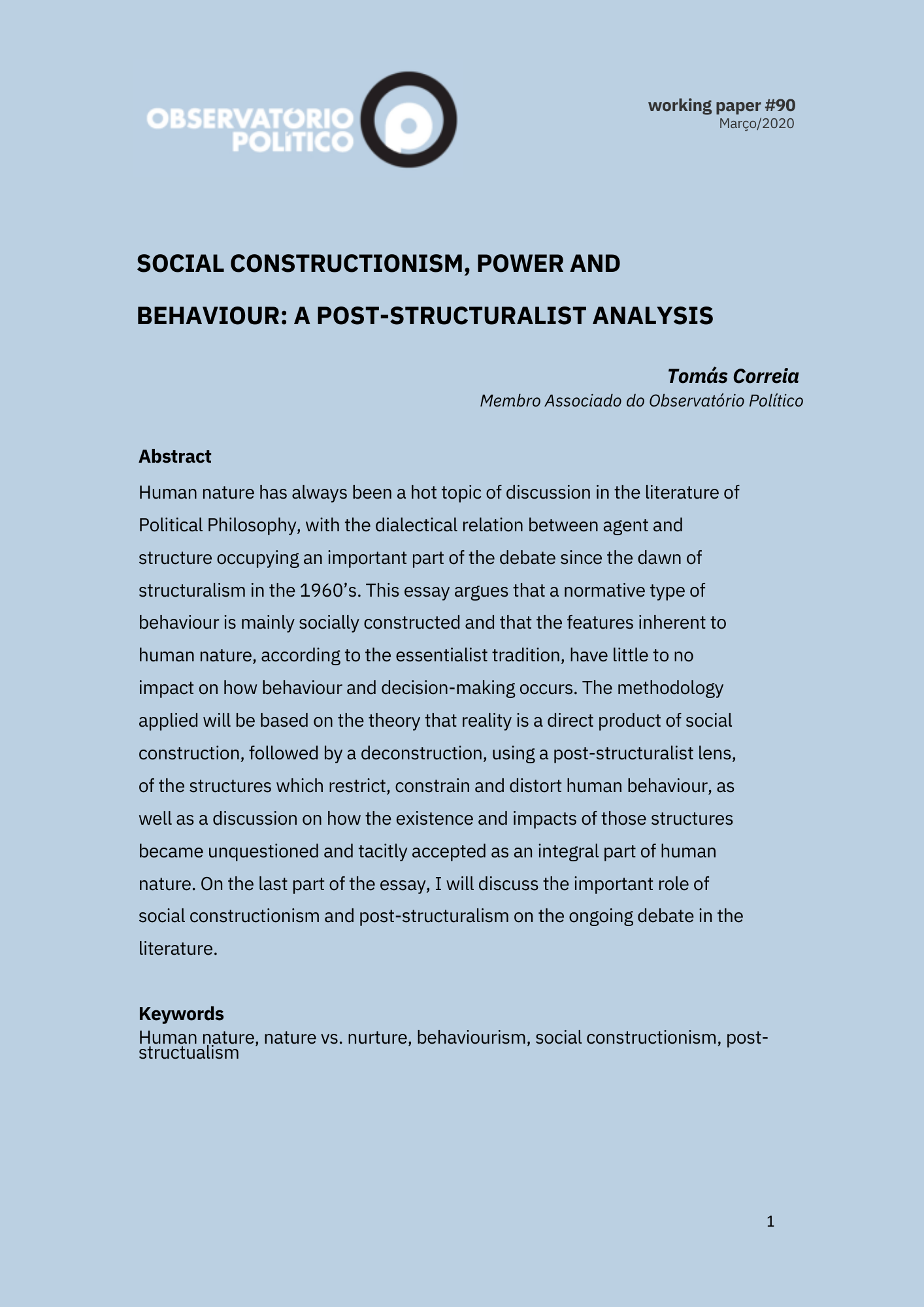
2019
TEORIA CONSTRUTIVISTA E O POPULISMO CONTEMPORÂNEO: O CASO BRASILEIRO
Náthaly Calixto | WORKING PAPER #89
The current political framework of the international community shows numerous politicians seeking votes with keywords such as: nation, equality, and values. Such phenomenon has worked, generating great legitimacy and popular support. At the same time, the world today is heading for dangerous extremist paths, which leads us to reflect on the ramifications of the actual populism. In the International Relations field, it is studied that one of the theories that seeks explanations and legitimacy, exactly in the logic of culture and values, is the constructivist. This working paper analyzes, in particular, the election of President Jair Bolsonaro, addressing the influence of such a theory on the contemporary populism on the international scene and especially in Brazil.
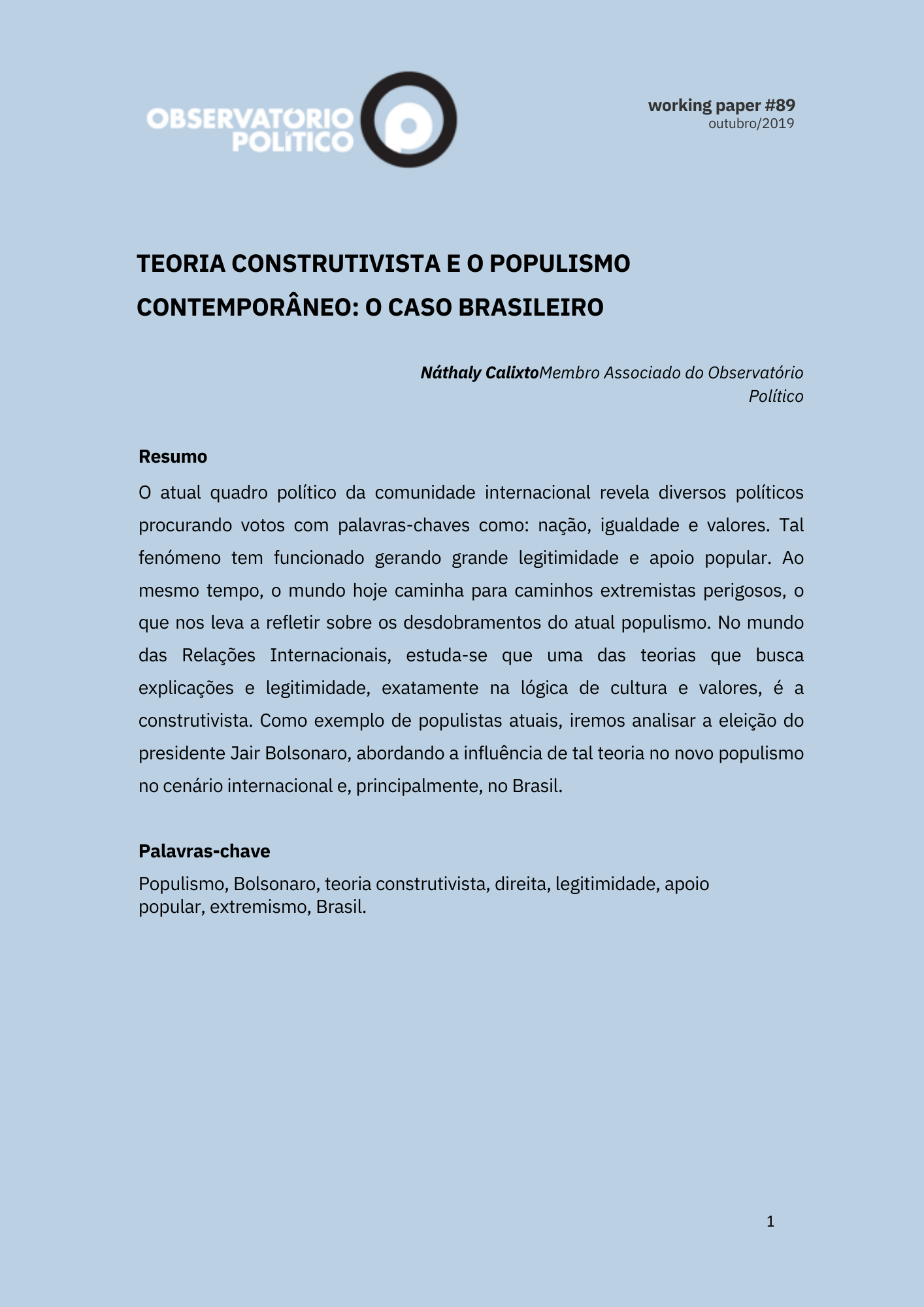
THE EUROPEAN UNION TRUST FUND FOR AFRICA: A LITERATURE REVIEW
João Monteiro | WORKING PAPER #88
The following paper provides a critical literature review about The European Union Emergency Trust Fund for stability and addressing root causes of irregular migration and displaced persons in Africa, also known as the European Union Trust Fund for Africa. It identifies two dimensions of analysis of the EUTF for Africa from the literature, each of them raising different sets of questions. The first one looks essentially at its structure, while the second one compares its goals and functioning with conventional development policy projects. By splitting the analysis of the EUTF for Africa, the paper aims to contribute to the discussion about the implications of the design and goals of such instruments, which added value can be examined according to two different perspectives.

THE ROLE OF THE UNITED NATIONS IN OVERCOMING THE EROSION OF THE INTERNATIONAL LIBERAL ORDER IN THOMAS WEISS’S PERSPECTIVE
Helena Inácio | WORKING PAPER #87
This paper revisit part of Thomas Weiss’s academic work, in order to try to answer the question “Will the United Nations be able to overcome the current erosion of the International Liberal Order?”. It will give particular relevance to the author’s theorizing and development on the concept of “global governance” and the capacity of the UN as a keystone in the maintenance of the world order.
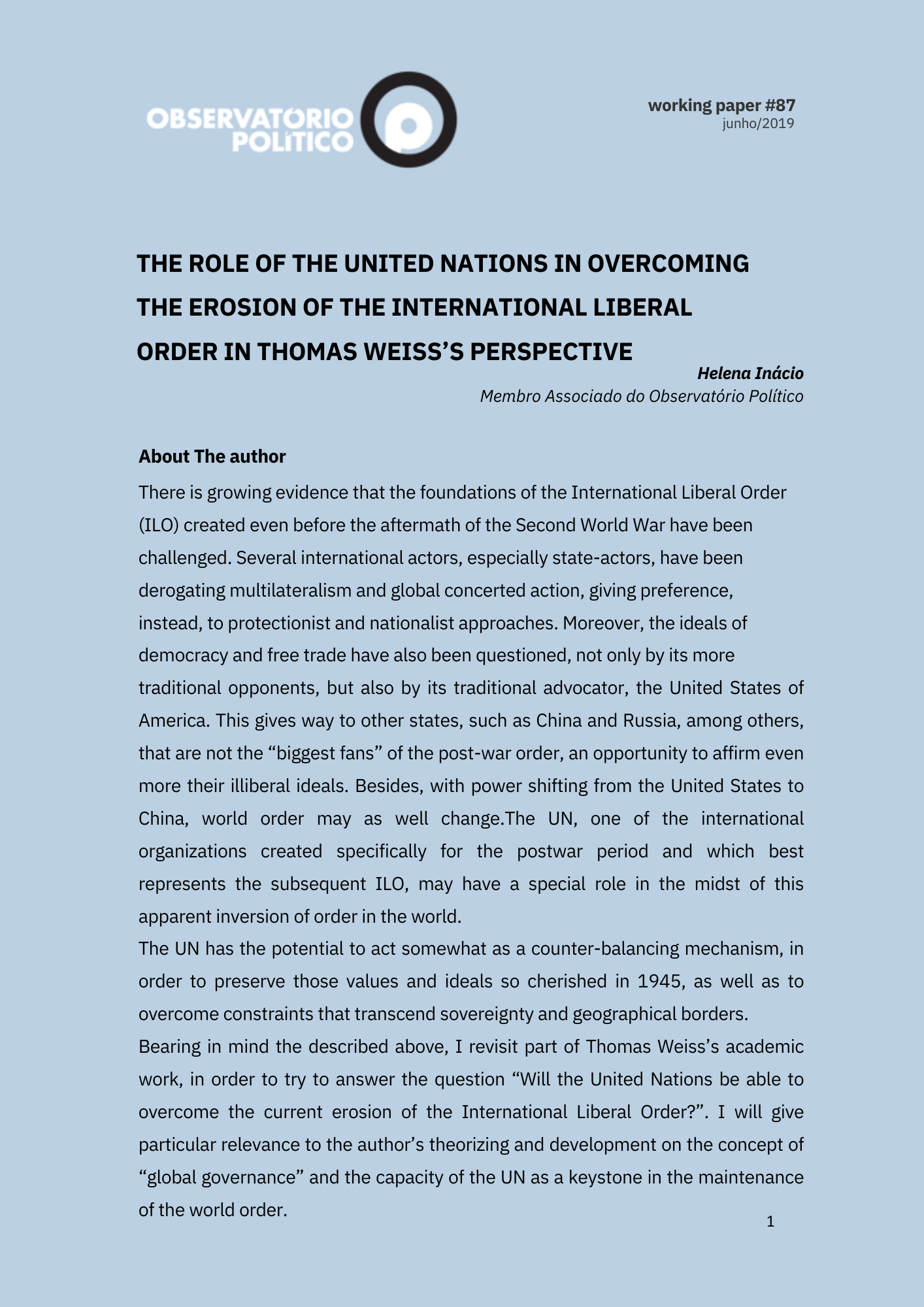
PORTUGAL AND SWEDEN – DIPLOMATIC HISTORY AND BILATERAL FOREIGN POLICY
Luís Sargento Freitas | WORKING PAPER #86
This paper intends to analyze the foreign policies of Portugal and Sweden and study diplomatic exchanges from former Portuguese officials in several decades. It will have a greater focus on Portuguese foreign policy and diplomacy, however, a review of Swedish foreign policy and history shall also be performed. Bilateral political negotiations and foreign policy research between these two countries have never been developed using this method. This research will analyze this centuries-old relationship particularly during World War II, the Cold War and the Portuguese Colonial War, and the road towards Europeanization..
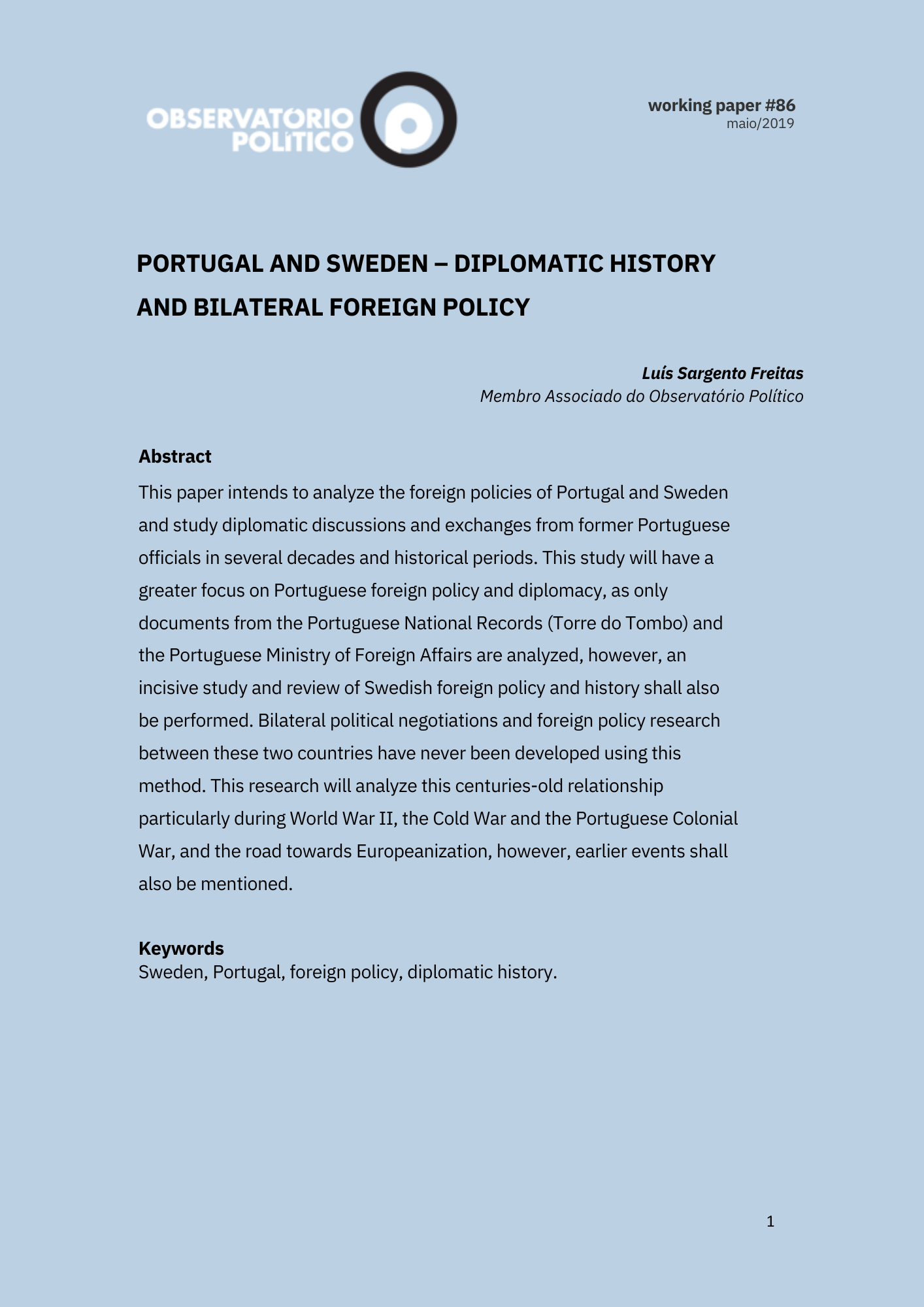
PORTUGAL E A AUTODETERMINAÇÃO DE GÉNERO: UMA ANÁLISE DISCURSIVA
Sara Teixeira | WORKING PAPER #85
Thinking about gender ideology and its mutability is to understand that at long steps with the evolution of the movement, walks the civil society. In it, the media and the states play a great role in informing and protecting citizens, respectively. When we think about news discourse, it is easy to understand the media ability of transposing subjects to the political agenda and frame them into the understanding of citizens. This analysis is based on the Portuguese law n. º 38/2018.
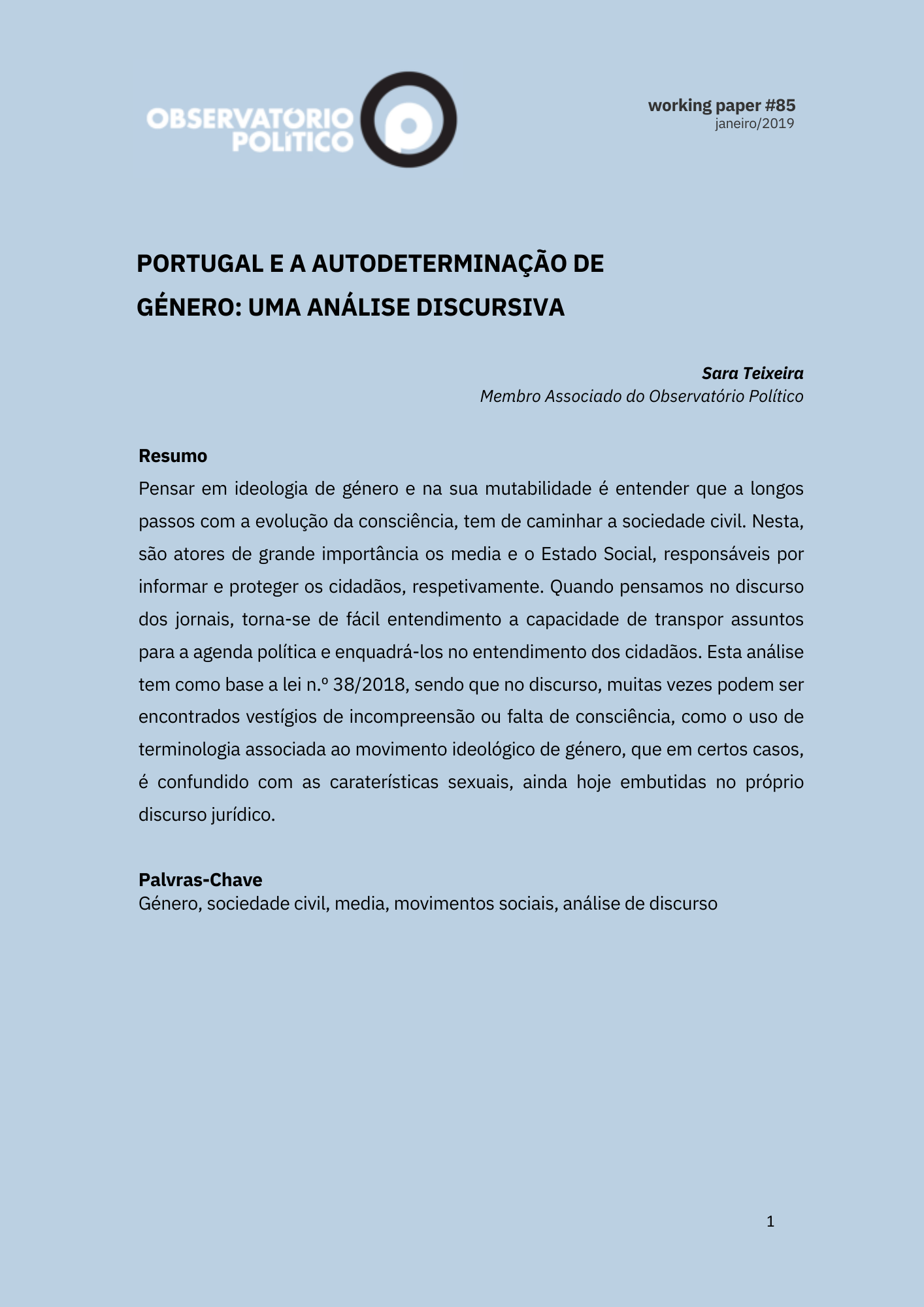
2018
CORRUPÇÃO E CULTURA POLÍTICA EM TEMPOS DE CRISE: IMPLICAÇÕES PARA A DEMOCRACIA BRASILEIRA
Andressa Costa | WORKING PAPER #84
Brazil is facing a scenario of high distrust regarding institutions, the government and its representatives, presenting also dissatisfaction with democracy due the lack of answers from the political system to citizens’ expectancies. In addition, the recurrent corruption scandals lead to a perception from society that corruption is generalized among the political class, stressing negative evaluations about democracy and the political system. So, this paper aims to analyze the relation between perception of corruption and the Brazilian political culture. For that, the paper will use empirical data from the Latin American Public Opinion Project (LAPOP), from 2016/7, and the Latinobarometro, from 2016.
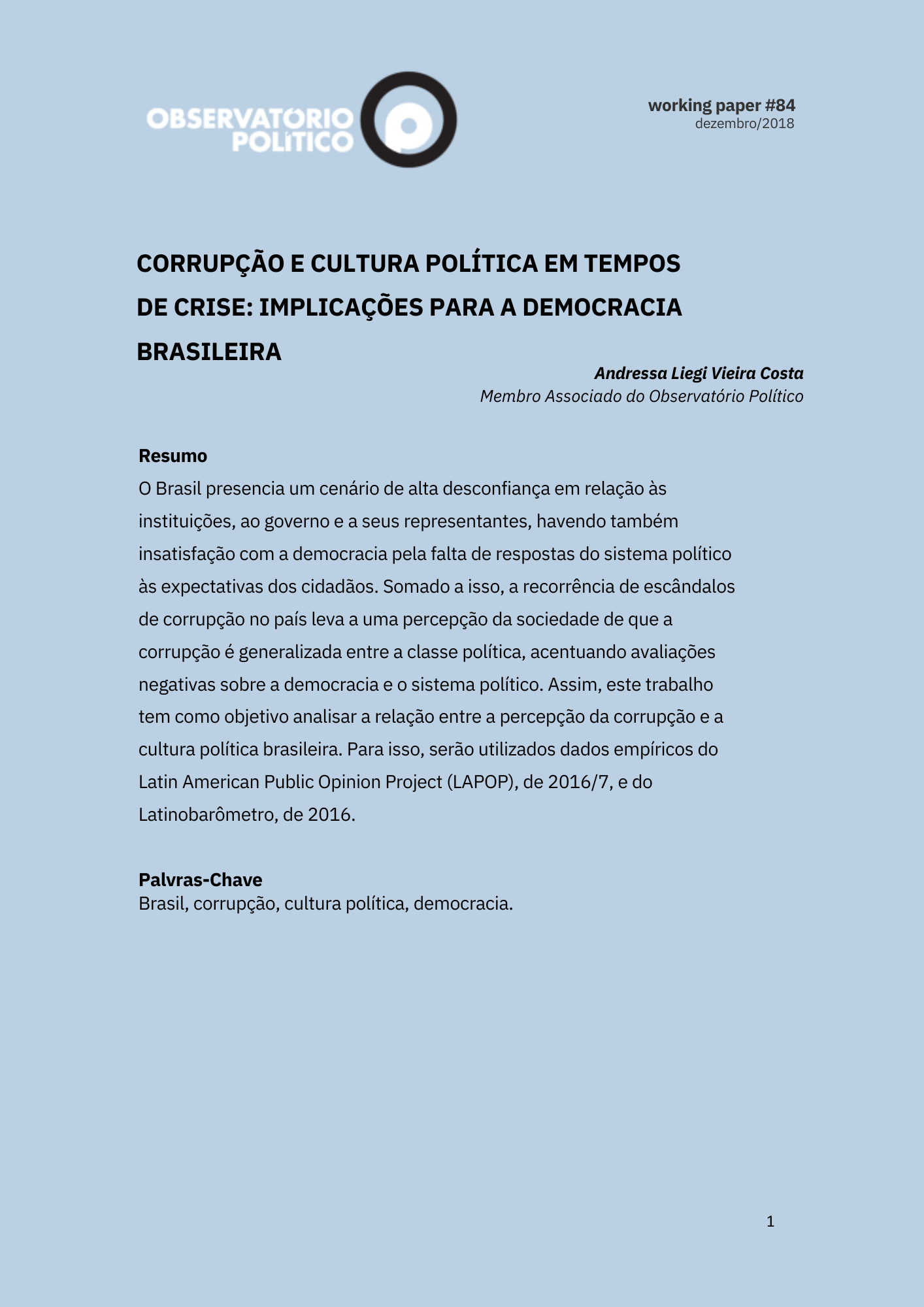
FROM RITUAL INFANTICIDE TO POLITICAL POWER. A FRAME FOR THE STUDY OF POLITICAL POWERS IN GUINEA BISSAU
Cláudia Favarato | WORKING PAPER #83
The present paper aims to frame political power configurations in Guinea Bissau, to pinpoint the foundational differences between the state system and the traditional powers. In order to unveil such a complex reality, a case study will be used, the criança-irân ritual of infanticide. The latter, underpinned in the local animist cosmological system, is a challenge to the ontology of humanness, and to the boundaries between nude and political life.
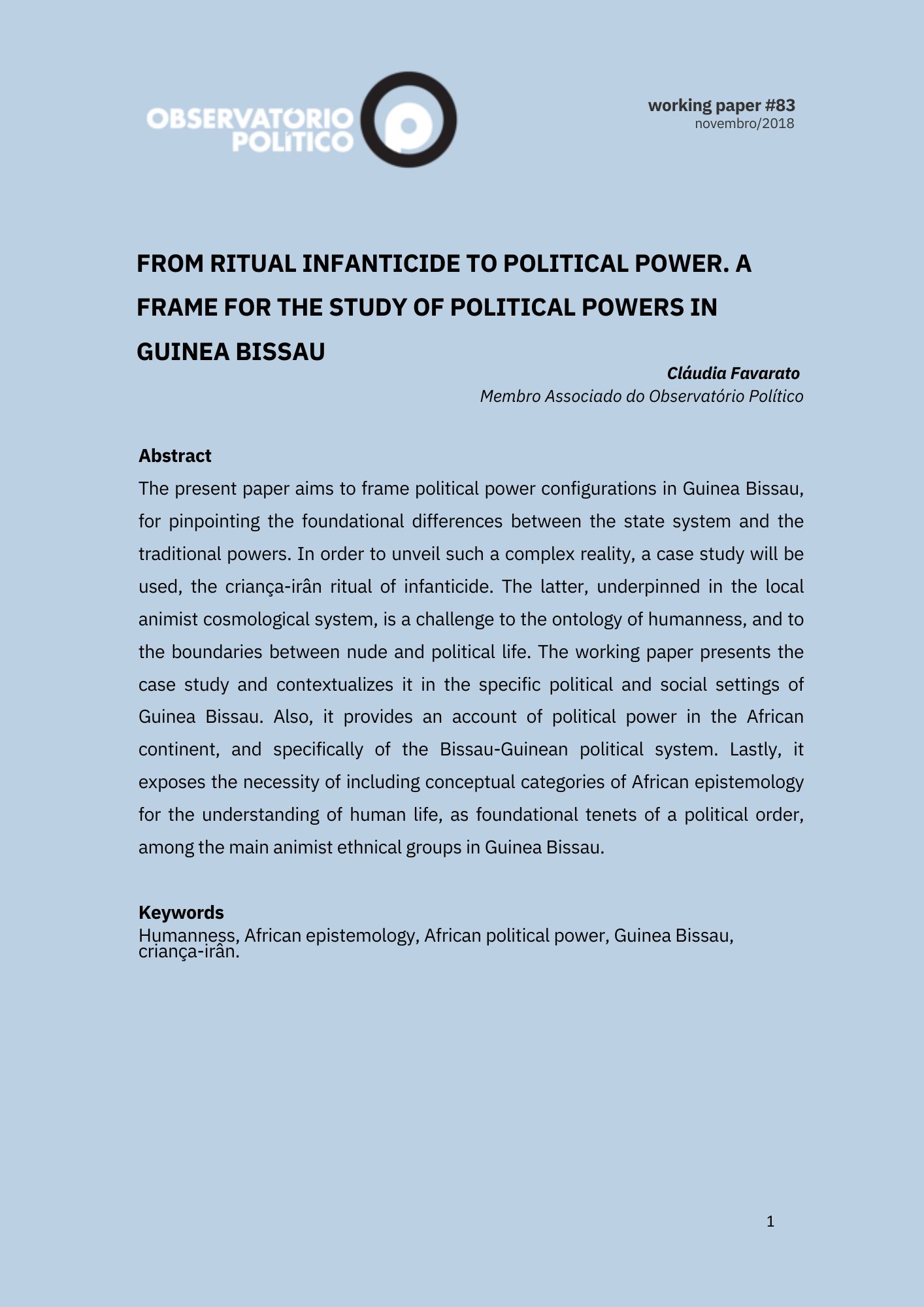
ANALYZING THE COMMON AGRICULTURAL POLICY AS A CASE OF CONCEPTUAL SHIFTS (1957-2016)
Luís Sargento Freitas | WORKING PAPER #82
The Common Agricultural Policy (CAP) is the oldest and the most expensive communitarian policy in the history of European political integration. It exists since the Treaty of Rome of 1957, and from then on, it has evolved under the operationalization of three central concepts: productivity, competitiveness and sustainability. This paper will observe in which way the operationalization of these concepts serves the purpose of explaining the legislative history of the CAP and its most important stepping stones: the Treaty of Rome, the Mansholt Plan of 1968, the MacSharry Reform of 1992, the Agenda 2000, the Fischler Reform of 2003, the CAP Health Check of 2008, the Lisbon Treaty of 2009, the 2013 CAP reform, and the initial effects of the “Brexit” process.
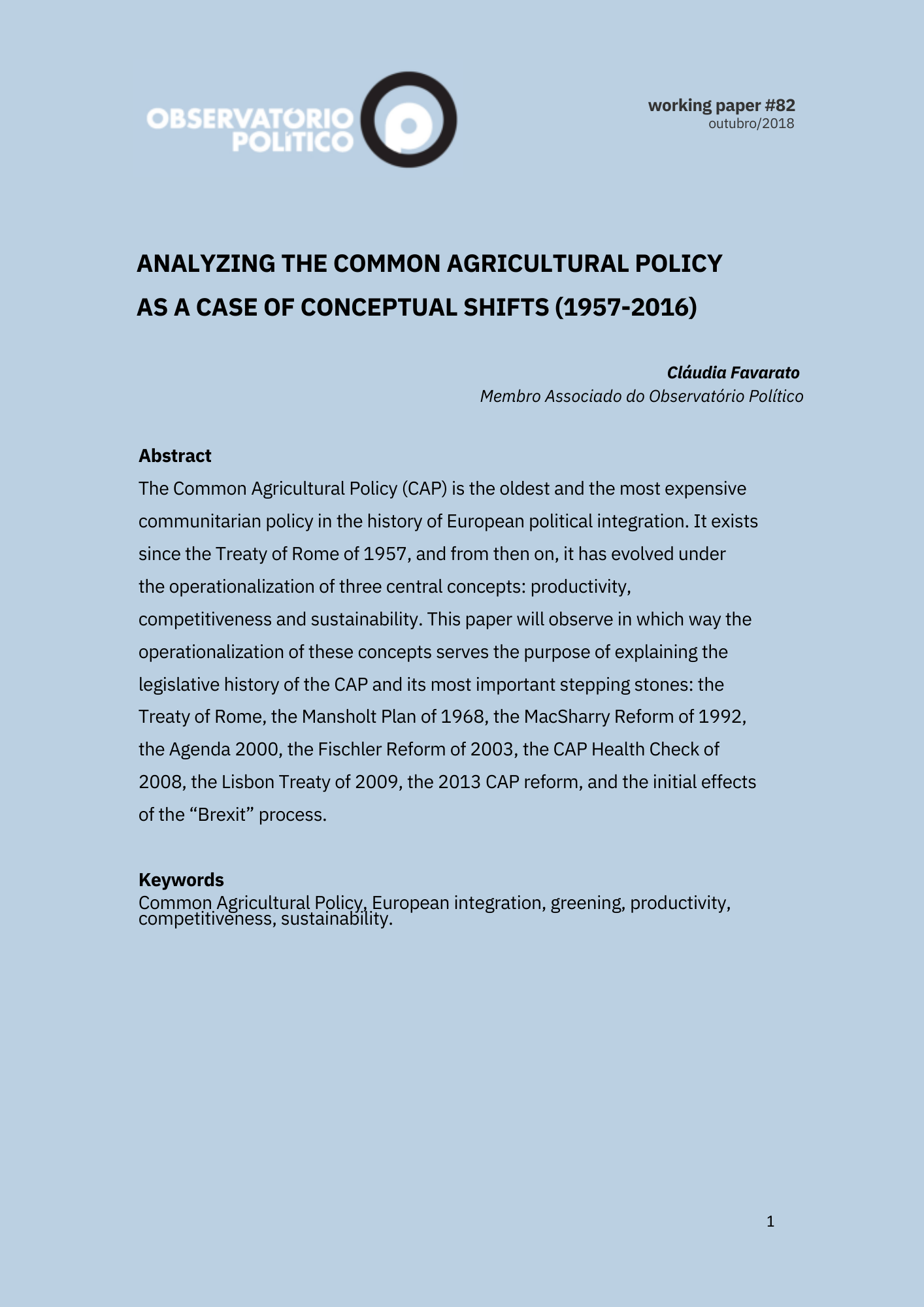
CAMPO DE CONCENTRAÇÃO: A INSTITUIÇÃO TOTAL DE UM REGIME TOTALITÁRIO
Helena Tojo e Margarida Pereira | WORKING PAPER #81
The literature on Nazi ideological domination and its instruments is extensive, yet incomplete in a perspective of its social construction. In concentration camps in specific, every process from the entry of the inmate is symbolically significant for the conditioning of their stay in the institution, through destruction mechanisms of the “self”. This working paper allows us to review this process in Goffman’s concept of “total institution” and to extrapolate the same, in its characteristics, to the regime that creates it.

MERITOCRACIA, APENAS O MENOR DOS MALES?
Carlos Alves | WORKING PAPER #80
Intuitively we consider that not rewarding merit is like leaving the most valuable player sitting in the bench whilst letting him play is a synonym of justice. Meritocracy rewards performance by solely judging merit. Is this a fair system? The purpose of this working paper is to illustrate how meritocracy ends up being a dangerously fallacious discourse that fails what it aims to reach. Meritocracy is presented as a fair system but risks not being more than a myth.

“PORTUGAL ISN’T A SMALL COUNTRY”: THE CONSTRUCTION OF COLONIAL MEMORY UNDER SALAZAR’S ESTADO NOVO
Teresa Bandeira de Carvalho | WORKING PAPER #79
The Estado Novo was the only stable totalitarian regime in Portugal. Its conservative character with an emphasis on Portuguese traditionalism brought back a cult to the Discoveries period and to the greatness of the nation. The aim of this working paper is to analyse the role of Salazar’s policies in the construction of a colonial memory that has lasted to the present. I will analyse the 1934 and 1940 Expositions and their role in this construction.
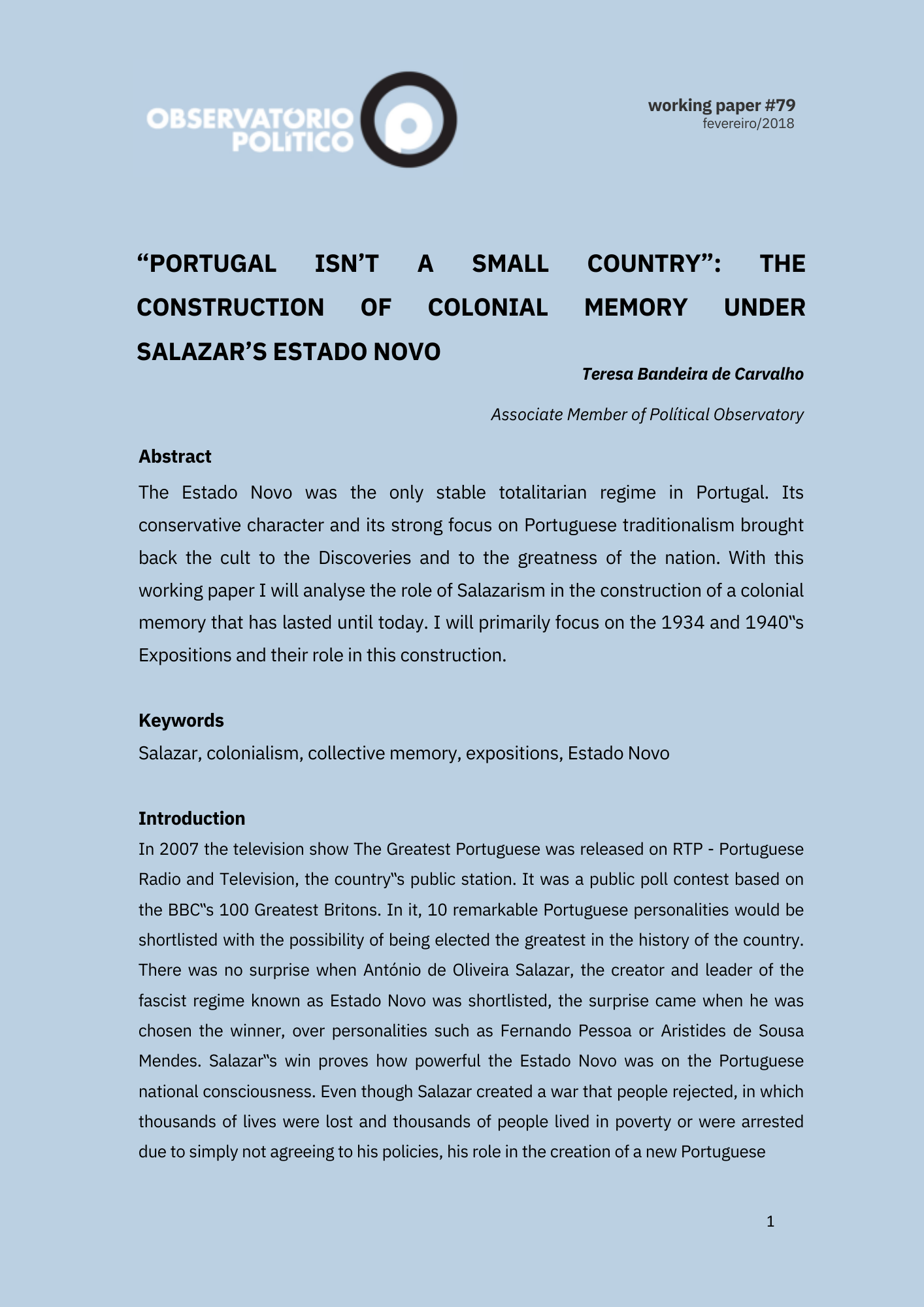
CÁUCASO, CÁSPIO E POLÍTICA INTERNACIONAL: UMA ANÁLISE DO CONFLITO DE NAGORNO KARABAKH
Marta Ramos | WORKING PAPER #78
After the Cold War, it is widely acknowledged that the systemic architecture in which interstate relations occurs has been altered. Thus, coupled with other paradigmatic technological changes, the content of geopolitical theories has also been altered since then. As such, has it in any way made the way states conduct their political vectors rendered obsolete concerning the analysis of ongoing conflicts? This working paper intends the application of a geopolitical approach focused on realpolitik and the struggle for power and resources in the ongoing conflict between Armenia and Azerbaijan over the territory of Nagorno-Karabakh.

2017
EUROPEÍSMO E “SOBERANIA COMPLEXA”: UMA ABORDAGEM SINTÉTICA A PARTIR DO PENSAMENTO DE PETER SLOTERDIJK
Orlando Coutinho | WORKING PAPER #77
“Sovereignty” as a political principle allows the discussion of the Europe that we have today. The sovereignty(s) in of itself complex, if we take into account the various dimensions of “multi-level governance” inscribed in the European Union, combined with Brexit, has increased the need of this debate. Under the pretext of a small work of the German philosopher Peter Sloterdijk, we are able to forge the starting point for this discussion.

SALAZARISMO: AUTORITARISMO OU FASCISMO? A UNIÃO NACIONAL EM PERSPECTIVA ORGANIZACIONAL E COMPARATIVA
Hugo Ferrinho Lopes | WORKING PAPER #76
Salazarismo in Portugal has been the target of several interpretations. For academics, the Salazar period is one of the most problematic political regimes to classify. While an academic sphere tends to exclude Estado Novo from totalitarianism, drawing it closer to authoritarianism, another school of thought argues that Salazarismo follows a fascist ideology. As a result of this typological divergence, the main objective of this paper is to clarify this issue.

EDUCAÇÃO: A ÁGORA OU WALL STREET? – UMA FALSA QUESTÃO
Carlos Alves | WORKING PAPER #75
According to Martha C. Nussbaum there is a narrow and delicate connection between democracy and humanities. A profitable relationship that reinforces democracy, since the curriculum that constitutes arts and humanities is fundamental to form autonomous citizens, concerns those who surround them and the problems of their time.

A LUTA ARMADA REVOLUCIONÁRIA EM PORTUGAL: UMA HISTÓRIA AO LUAR
Duarte Carrasquinho | WORKING PAPER #74
Portugal lived in a dictatorship from 1923 to 1974. The regime was firstly like a military dictatorship and later, after 1933, with the designation of “Estado Novo” [New State]. During this time, many political organizations fought undercover against the Estado Novo with the Portuguese Communist Party (founded in 1921) standing out. In 1967, the League of Unity and Revolutionary Action (LUAR) was born. Featuring unique characteristics in comparison to the organizations created before it, the LUAR executed singular revolutionary actions of an almost cinematographic imaginary.

UMA VISÃO SISTÉMICA DA SOCIEDADE E DOS PARTIDOS POLÍTICOS: ROBERT MICHELS E O OLIGÁRQUICO-ELITISMO
Tiago Rego Ramalho | WORKING PAPER #73
Western Modern Democracy, as we know it today, is inseparable from a civilizational freedom – Freedom of Association – as John Stuart Mill affirmed in the XIX century. Political parties, with regard to the representativeness of citizens, play a preponderant role in the Democratic model, which is unanimously accepted by Western culture. Are they useful and viable in the face of the current paradigm, responsible and representative of their fellow citizens?

POLÍTICA COMO A CONSTRUÇÃO DO POVO VERSUS O FENÔMENO DAS MULTIDÕES COMO A MORTE DA POLÍTICA: AS PERSPECTIVAS TEÓRICAS DE LACLAU E NEGRI
Fátima Lampreia Carvalho | WORKING PAPER #72
This article contrasts the idea of people and populism in On Populist Reason by Ernesto Laclau (2005) and the idea of multitude in Multitude: War and Democracy in the Age of Empire by Antonio Negri and Michael Hardt (2005). This dialogue between political science categories aims to explore the emergence of the universal actor in Laclau’s post-structuralist approach in contrast with the emergence of the multitude in the Deleuzian approach of immanence, preferred by Negri and Hardt.

NATION BRANDING: O PODER DAS IDEIAS NAS RELAÇÕES INTERNACIONAIS CONTEMPORÂNEAS
Cristiana Oliveira | WORKING PAPER #71
Given its recent, multidimensional and multidisciplinary nature, the concept of nation branding is little explored in the field of International Relations, although the number of states using nation branding strategies is increasing and more diverse. Its main objective is to create, manage and improve the image of a particular state through the use of branding and marketing techniques in order to become more attractive and competitive internationally. This working paper aims to introduce the concepts of nation brand and nation branding, identify the main characteristics and objectives of nation branding strategies, as well as the role played by several partners in the development of these strategies.

MALI PEACE PROCESS. CONSTITUTIONAL IMPLICATIONS OF THE ALGIERS PEACE PROCESS AGREEMENT
Maria Ejarque Albuquerque | WORKING PAPER #70
More than half of the world´s constitutions have been written or revised in the past two decades, often following a crisis (civil war or a volatile violent political transition), requiring international intervention, under the auspices of the United Nations. These constitutions are also used as a peace agreement or a provisional administration agreement containing transitional power sharing arrangements. They are often established until the necessary conditions for both constitution-making and constitution drafting processes and for the holding of free and fair elections are met. Therefore, the purpose of this essay is to analyze how constitutions are often used as peace agreements.
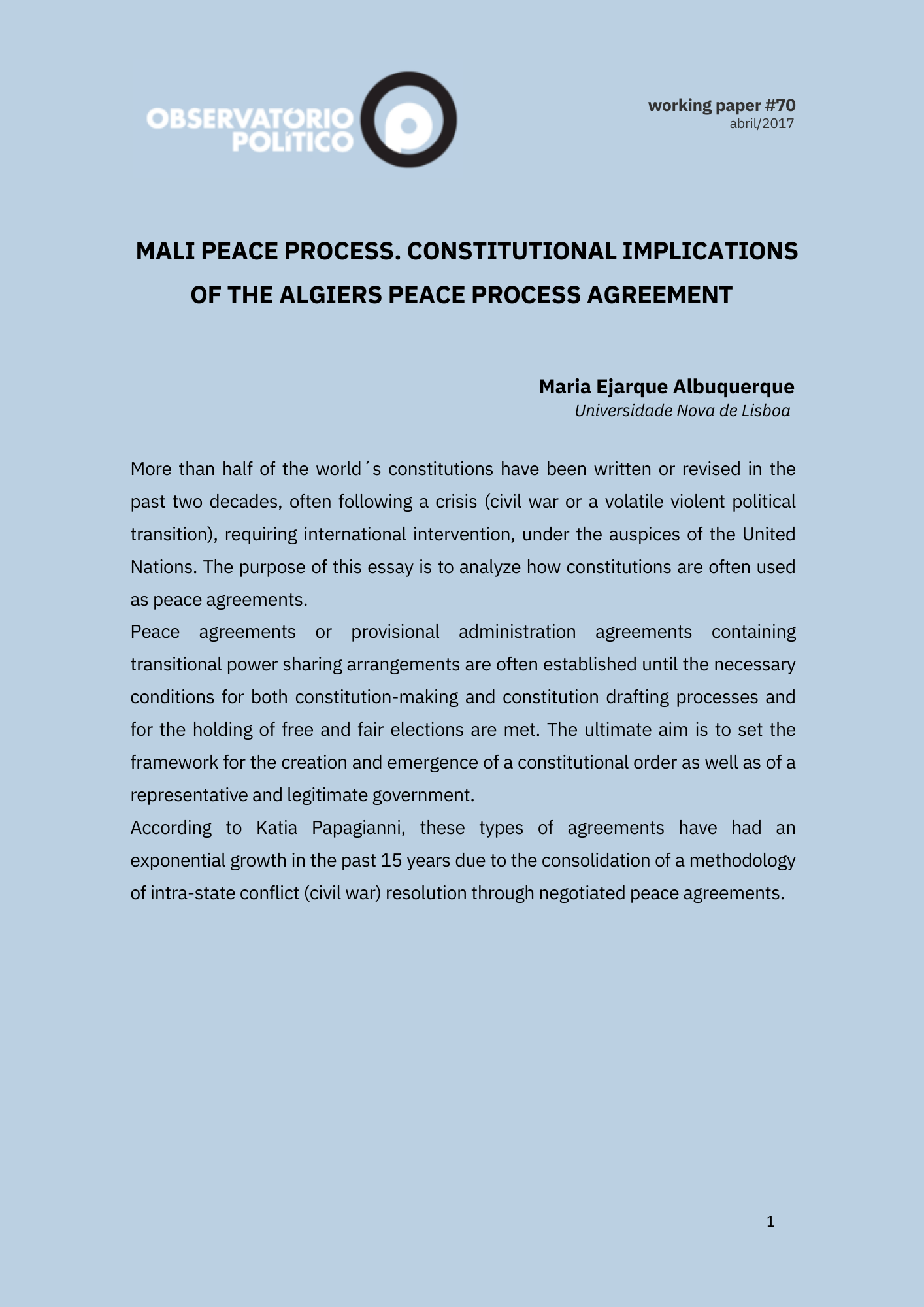
A LIDERANÇA E O GÊNERO NA MEDIA POLÍTICA BRASILEIRA: DILMA ROUSSEFF E AS ELEIÇÕES DE 2014
Marina Finger | WORKING PAPER #69
In the political area, feminine empowering is still a very delicate question, as it still perceived as a masculine area. The leadership prototype theories help us understand the walls that the female gender needs to overcome to reach such positions, because the assumptions on gender can put in women in a leadership role the weight of gender incongruity. The objective of this paper is to identify the way that the media has treated the candidature to the presidency of Dilma Rouseff in the presidential campaign of 2014, in order to evaluate the presence of role incongruity in the outlook vision that the media portrayed.
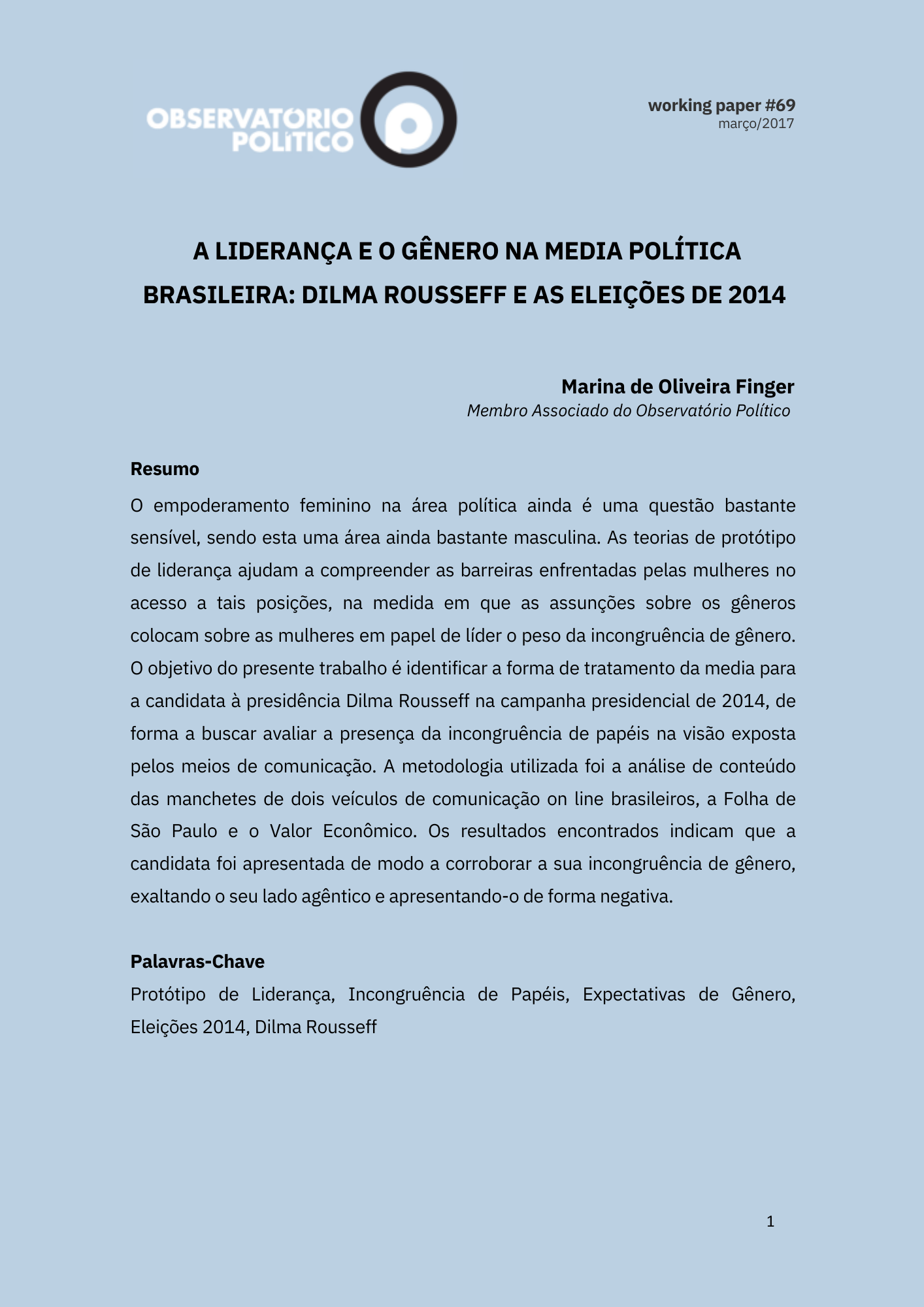
O ESTUDO DOS ASSUNTOS RELIGIOSOS PELA CIÊNCIA POLÍTICA
Jorge Botelho Moniz | WORKING PAPER #68
In the present work, we intend to analyze the validity of the assertion that political science has been ignoring religious themes in the studies of political events, in particular since the end of the 20th Century. In order to do so, we examine the content of political science periodical publications from a group of European countries. Our observation period is between 2010 and 2015, and our assessment indicates that despite political scientists insist on underestimating the relevance of religious matters and/or the periodicals offer poor space to such themes, the frame is not so negative as the state of art denounced.
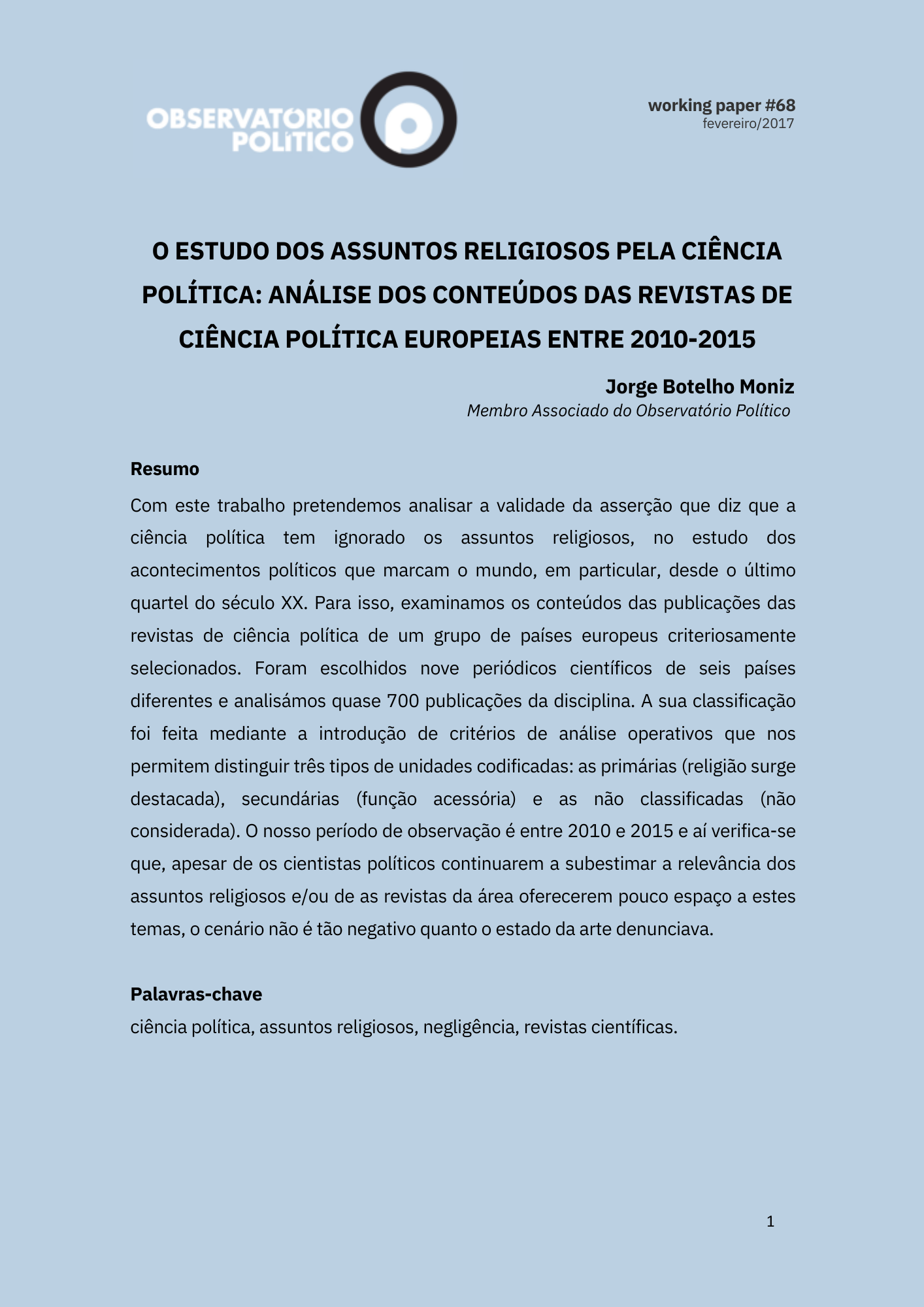
PAVING THE NEW SILK ROAD: THE EVOLUTION OF THE SINO-GERMAN STRATEGIC PARTNERSHIP
Alberto Cunha | WORKING PAPER #67
The emergence of China as a global economic leader has led to talks of a “New Silk Road” that the Chinese government wants to recreate in Eurasia, and that connects EU and China through Eurasia. This paper will focus on the bilateral relation between China and the undisputed EU economic leader, Germany, given the continued absence of a common EU foreign policy on China. The investigation seeks to identify the changes in the political approach to this bilateral relation since its beginning in 1972, as well as the advantages that the two states seek to draw from it.
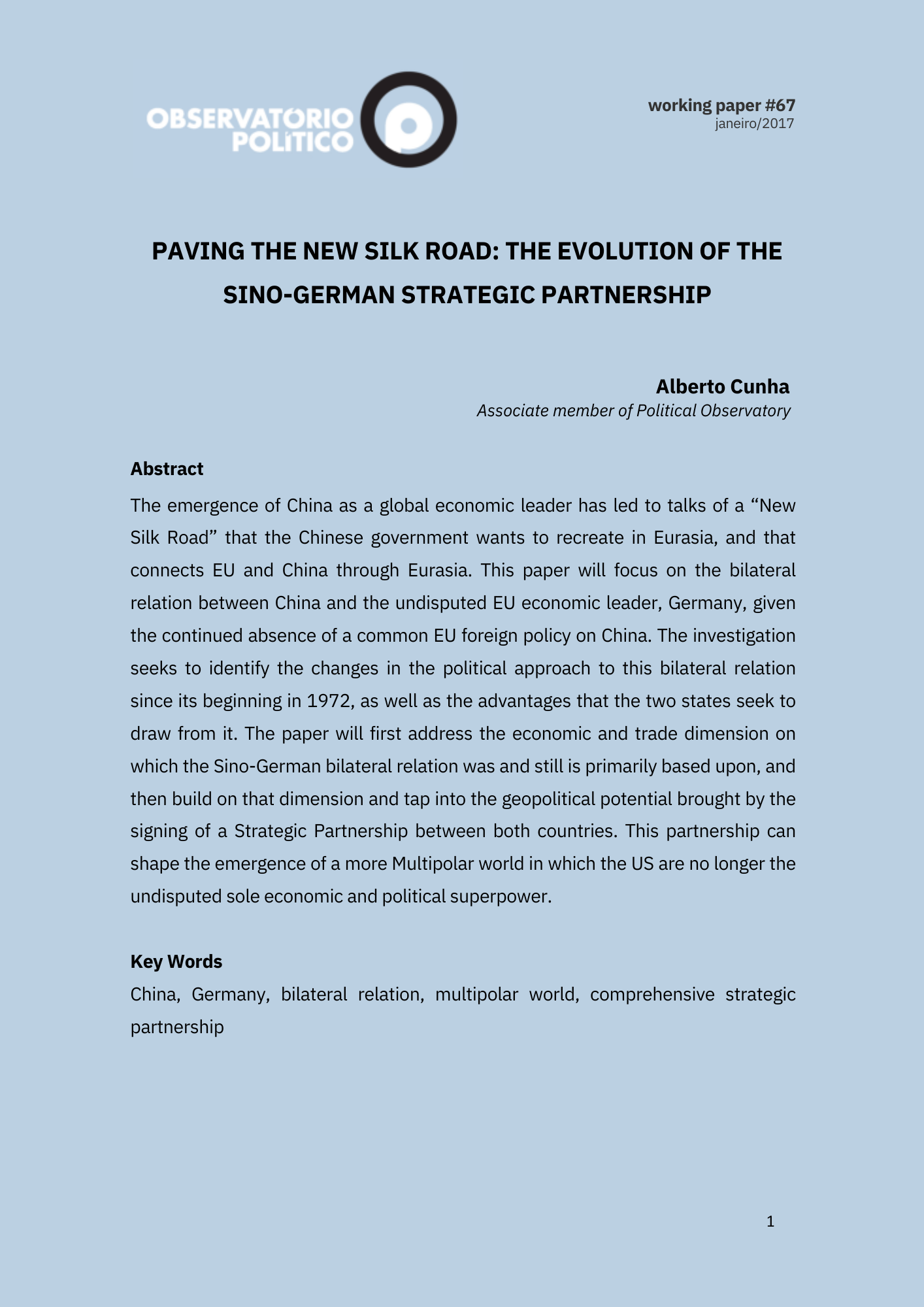
2016
REPRESENTAÇÃO POLÍTICA E DEMOCRACIA: UMA ANÁLISE DO PANORAMA POLÍTICO CONTEMPORÂNEO A PARTIR DE HANNA PITKIN
Orlando Coutinho | WORKING PAPER #66
There are a number of recent political events that justify revisiting thinkers who have addressed the issue of representation in global democratic systems. This working paper aims to construct an argument that, through a reflective interpretation on Hanna Pitkin’s “The Concept of Representation”, provides a “justification” that opens up a number of debates about some of the most recent historical episodes, highlighting the need to continue to discuss the challenges facing democracy today, and pointing out some prospective questions about the ongoing debates and about the ones to come.

A EVOLUÇÃO DO DIREITO DE SUFRÁGIO NA HISTÓRIA CONSTITUCIONAL PORTUGUESA
José Pedro Almeida | WORKING PAPER #65
Like many other legal and political prerogatives, the evolution of the right to vote can not be understood when disconnected from its involving historical context. The Portuguese case is not an exception, its political and constitutional history are intrinsically connected. The successive Constitutions, not immune to external influences, are a reflection of the historical context that emerged and was projected. Constituted of advances and retreats, the uncertain evolution of suffrage in Portugal can therefore contribute to explain the “constitutional legitimacy crisis” diagnosed by some authors.

AS MOTIVAÇÕES QUE LEVAM OS JOVENS A ADERIR AOS PARTIDOS POLÍTICOS EM PORTUGAL
Patrícia Tomás | WORKING PAPER #64
The relationship of young people with politics is a subject increasingly studied in Portugal and other world regions, given the importance of young people in the future of the democratic society. This study aims to understand the motivations that lead young people to join political parties in Portugal, more specifically if young people decide to join in a party organization because of moral, social or professional reasons, if the family influences the membership of young people and if the moment of membership matches with electoral acts.
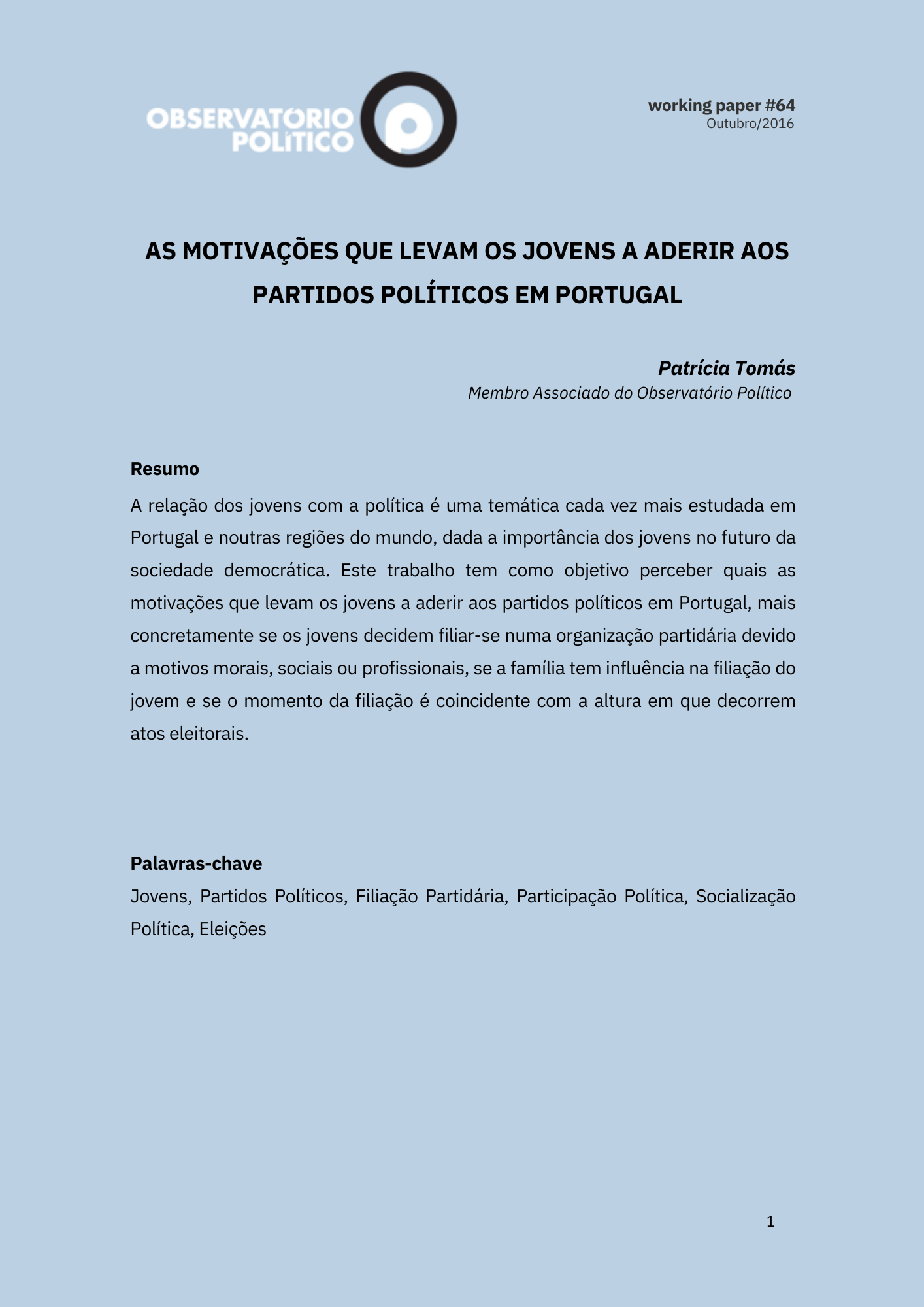
PORQUÊ O CONFLITO ARMADO EM MOÇAMBIQUE? ENQUADRAMENTO TEÓRICO, DOMINÂNCIA E DINÂMICA DE RECRUTAMENTO NOS PARTIDOS DA OPOSIÇÃO
Emmanuel Cortês | WORKING PAPER #63
After 16 years of civil war, from 1977 to 1992, between the Mozambican government led by the one-party state, FRELIMO, and the anti-communist faction known as Mozambican National Resistance (RENAMO), the General Agreements of Peace were signed in Rome thus ceasing the armed conflict. Although civil war officially ended in 1992, Mozambique has seen an increase of armed violence between the government led by FRELIMO and RENAMO.

A EVOLUÇÃO DOS CONFLITOS E DA ORDEM MUNDIAL NUM MUNDO MULTIPOLAR
João Sampaio | WORKING PAPER #62
The World Order is a concept in constant reformulation that has lost what characterized it when it was established through the Westphalia Agreements. The conflicts related to it also went through mutations. This study aims at establishing a connection between the contemporary World Order and the evolution of conflicts. The threats to the stability of the World Order contribute to its present disorder and evidence how conflicts dissociated themselves from its clausewitzian concept. The crisis in Ukraine was the case of study selected to understand how these threats impact the stability of the World Order and evidence the conflicts evolution.

REPRESENTAÇÕES MEDIÁTICAS DA “NOITE QUE MUDOU A ALEMANHA”1 : A VIOLÊNCIA SEXUAL COMO VEÍCULO DE ISLAMOFOBIA?
Verónica Ferreira | WORKING PAPER #61
The New Year’s Eve incidents in the German city of Cologne sparked a special media interest. The information that was published by social media in the days that followed the event nourished a heated discussion about the European migration crisis and asylum concession policies, which began in mid-2015 with the increase of the refugee flow from the Middle East and Sub-Saharan Africa crossing the Mediterranean Sea with the aim of getting to Europe. The media representation of this episode could be inserted in a specific spatio-temporal context that we want to analyze.

(E/I)MIGRANTES E “RETORNADOS” EM PORTUGAL: DIREITOS HUMANOS, GEOPOLÍTICA E OS FLUXOS MIGRATÓRIOS (DO ESTADO NOVO À DEMOCRACIA)
Ana Campina | WORKING PAPER #60
This Working Paper has the purpose to approach a fundamental subject, Human Rights, which requires an initial conceptual explanation that allows us to understand other adjacent areas, on an elemental synergy with other phenomena of the recent history of Portugal – from the New State to the present. Thinking and addressing migration in Portugal leads us to the necessary human rights matters, to Geopolitics and to a social phenomenon that we lived at the beginning of Democracy which currently isn’t always treated or valued as it should be: those who were considered Returnees.

OS CONCEITOS DE LIBERDADE E SEGURANÇA EM THOMAS HOBBES: CONJUNÇÃO OU DISJUNÇÃO?
Hugo Ferrinho Lopes | WORKING PAPER #59
The relation between freedom and security has been subjected to several debates within social sciences and, particularly, in political science and theory of international relations. Without knowing exactly what they are and in what they consist, the concepts of freedom and security are perceived as unalienable rights, capable of capturing the attention of masses and mobilize its action around a specific purpose. In this sense, we will answer the following problematic: In what consist the freedom and security concepts in the political thought of Thomas Hobbes?

2015
NACIONALISMO E DESAFIOS CONTEMPORÂNEOS
Ana Rita Dias | WORKING PAPER #58
The traditional way of political organization, the Nation State, has been more and more challenged by the deepening of international cooperation, in major part by phenomenons such as Globalization and the broadcasting of cosmopolitan ideals. Could it still speak of nationalism in the contemporary Western world, or will society evolve towards a true global community? Taking into account the importance of feelings of belonging and individual identification in maintaining sovereignty, it is relevant to analyze the extent to which these emotions already transcend – or not – the nation-state. Are we on the verge of creating a truly global individual identity?

PÓLIS, PARTICIPAÇÃO POLÍTICA E AS MULHERES: JOHN STUART MILL
Tiago Rego Ramalho | WORKING PAPER #57
As one of the most influential thinkers of the Western Civilization, John Stuart Mill developed a wide work on the most diverse scientific domains. The defense of women’s rights that resulted in their emancipation was one of the greatest milestones in the English thinker’s life. In a specific context like the one that existed in the first half of the XIX century in England and in most of western societies, the concept of Woman was still very archaic. Stuart Mill accepted to face the problem.

OS DESAFIOS DA SEGURANÇA COMUNITÁRIA AFRICANA: ENTRE A RETÓRICA DISCURSIVA E A PRÁTICA POLÍTICOMILITAR, QUID DO PAPEL DA UNIÃO AFRICANA NOS PROCESSOS DE PEACEKEEPING E PEACEBUILDING NO PANORAMA CONTINENTAL?
Ricky Apolo | WORKING PAPER #56
The complexity of the security landscape in Africa requires from the organizations that integrate it concerted and multisectoral approaches with long term and broad range impacts. This working paper intends to examine the security engineering the African political actors have conceived in the spectrum of the African Union with the intention of eradicating the long epidemic conflicts that have been weakening the African rebirth process.

O RETORNO DA ALIANÇA CELESTIAL: INTERDEPENDÊNCIA ECONÓMICA E A QUESTÃO ENERGÉTICA
Joana Lemos e Silva | WORKING PAPER #55
The Bouleversement that was created by the conflict, which started in 2014 in Ukraine, overthrew the President Yanukovich, intensified the relations on the area, and elevated the interested States to a distinguished level in international relations. For these reasons it is decisive to analyze the levels of economic interdependence between Russia and China. This interdependence is important because of the economic constrains that Russia suffered after the imposition of sanctions to the energy sector – essential to Russia. It is also important to study the political consequences that follow the economic interests of the two countries.

COMUNICAÇÃO, OPINIÃO PÚBLICA E FORMAÇÃO DE PREFERÊNCIAS ELEITORAIS
Rodrigo Oliveira | WORKING PAPER #54
Some people look at public opinion as the sum of individual opinions, as the reflection of the majority’s beliefs, as the opinion shaped by the media or by the elites or simply as fiction. This essay will focus on the third idea referred above, which implies public opinion is defined by the opinion shaped by the Media and elites. The most important contributions to this topic were Walter Lippmann’s Public Opinion, John Zaller’s The Nature and Origins of Mass Opinion and the article Monica Lewinsky’s Contribution to Political Science.

COMPETITIVIDADE FISCAL EM ECONOMIA ABERTA
João Ricardo Catarino | WORKING PAPER #53
The international tax competition is a phenomenon that has met quick developments in recent years. It influences the model of action of States and contemporary government. Some international reference institutions have sought to adopt principles to minimize the negative impact of these, such as the European Union and the OECD.

A CRISE E O ROMPER DO ROTATIVISMO: O CASO DO SYRIZA NA GRÉCIA
Ricardo Cabral Fernandes | WORKING PAPER #52
The current economic and financial crisis is changing the political chess of the European continent. If, on one hand we see the rise of extreme right-wing parties, on the other we see the fortification of radical left parties. The austerity policies and the structural reforms of neoliberal nature imposed to the intervened states, and also to those who weren’t, have led to serious economic,political and social consequences in the European people, creating new political phenomena that deserve to be studied.

CULTURA, PLURALIDADE E DEMOCRACIA ARTIGO BASEADO EM APOCALÍPTICOS E INTEGRADOS, DE UMBERTO ECO
Mariana Carmo Duarte | WORKING PAPER #51
Having in consideration mass culture and the cultural industries, Umberto Eco proposed, in 1964, in his book “Apocalyptics and Integrated” a division of both categories contained in the title of the work. If, on one hand, the “apocalyptics” considered that the massification of production and cultural consumption caused the loss of the essence of artistic creation, of a certain “aura” spoken by Walter Benjamin, on the other hand, the “integrated” believed that we were before huge intellectual advances, before a genuine and creator cultural democratization.

2014
DIVULGANDO A CULTURA DO OBSERVATÓRIO POLÍTICO: OS CURSOS
Catarina Sampaio Rolim | WORKING PAPER #50
The formation in key-areas of knowledge in Political Sciences and International Relations is subjacent to the goals of the Political Observatory since its creation. From diplomacy to autarchic management, through communication, safety, politics and human rights, O.P. has organized, so far, eleven advanced training courses. These are intended not only for its associated members but also to all professionals and students of diferent areas who show interest in deepening their knowledges. They have a group of experts whose quality of tuition is a garantee of the sucess all the initial and renewed editions had.

DIFERENDO INTERNACIONAL: DOKDO OU TAKESHIMA?
João C. Bandeira | WORKING PAPER #49
The follow research will focus on the Japan – Republic of Korea conflict, regarding the matter of the Liancourt Rocks, addressing the historical background, the Peace Treaty of San Francisco 1991, the arguments of legitimized sovereignty presented by both states upon the Liancourt Rocks, the relationship between the USA, Japan and South Korea during the Cold War, the treaties of joint exploitation signed by Japan and South Korea, enhancement of the EEZ projects, the changes in the political systems of both Japan and South Korea and the consequences of these changes.

THE COLONIZATION OF CRITIQUE: HABERMAS’ OVERRELIANCE ON SYSTEMS THEORY AND ITS IMPLICATIONS FOR CRITICAL THEORY
André Saramago | WORKING PAPER #48
Habermas’ critical theory has had a significant influence in international relations and social theory, especially in what concerns the appropriation of his reflections on discourse ethics. However, this appropriation has not sufficiently engaged with the wider aspects of Habermas’ project, namely his distinction between the societal realms of the lifeworld and the system, which arises from his attempted synthesis between Parsonian systems theory and critical theory. My argument in this article is that there are fundamental problems with Habermas’ usage of systems theory. Most significant, Habermas appropriates its dichotomous conceptions of society with significant implications for critical theory. Namely, such appropriation diminishes critical theory’s capacity to provide adequate frameworks for a better understanding of human societies and their development, making it unable to fulfil its critical role of providing adequate means of orientation for social movements in their emancipatory struggles.

THE URBAN MILIEU AND ITS SLAYING
Filipa J. C. Brandão | WORKING PAPER #47
Exposed to everything from earthquakes, floods, fires to smart bombs, cities are among the most durable artifacts. Not understood as ephemeral, buildings are meant to outlive life itself, making its destruction per se a shocking spectacle of violence. However, a deliberated and planned destruction of the city offers a new form of political violence. Urbicide then emerges as a pondered and aimed killing of the city, and of its built environment.

PARTICIPAÇÃO E QUALIDADE DA DEMOCRACIA NO PORTUGAL DEMOCRÁTICO: O CASO DO REALOJAMENTO NO BAIRRO DE SANTO ANTÓNIO, EM CAMARATE
Camila Rodrigues | WORKING PAPER #46
This paper results from exploratory empirical work done in the context of a PhD thesis on Political Science in the Faculty of Social Sciences and Humanities of the New University of Lisbon (FCSH-UNL). The thesis focuses on the study of the impact of the quality of democratic participation. It analyses the residents’ participation in housing policy, in Portugal, since the Revolutionary period. The topic’s interest results from the recognition of the democratic transition’s importance, with revolutionary character, as occurred in Portugal, which began the third wave of democratisations and allowed a reconfiguration of the power relations and social hierarchies.

A DICOTOMIA PÚBLICO-PRIVADO
Victor Correia | WORKING PAPER #45
The public-private dichotomy is the foundation of liberal thought, of the historical philosophical conception of tolerance, and of the partisan political ideologies. The goal of this paper is the analysis of this dichotomy from the point of view of this concept, and to show that there is a lack of consistency on its own while dichotomy, due to ambiguous meaning of its concepts. As a result, we can’t define what is private and public, due to the fact that we can’t define the boundaries between public and private life, and on the other hand, we can’t define the boudaries between public and private life, due to the fact that we can’t define what is public and private.

GEÓRGIA E A UCRÂNIA UNIDAS PELO PASSADO SOVIÉTICO E O SECESSIONISMO INTERNO
Paulo Cunha Dinis | WORKING PAPER #44
On the occasion of the presentation of my master’s thesis entitled “The autonomy of Georgia and the Russian foreign policy. An analysis of the Caucasus in consideration of Theory of Regionalization” in December 2013 at the Faculty of Social Sciences and Humanities of the New University of Lisbon, I tried to understand and expose the geopolitical reality that fits in the Democratic republics of the South Caucasus (Armenia, Georgia and Azerbaijan) in comparison with the foreign policy of the Russian Federation that Vladimir Putin has been developing in the last four presidential terms of the Russian Federation. The crisis of the Autonomous Republic of Crimea fits the growing socio-political conflict in the Democratic Republic of Ukraine as Georgia was faced with Russian interventional support for the secessionism in the regions of South Ossetia and Abkhazia. The problem is characterized by the diversity of positions, goals and instruments that strategies insert to the external relations.

CONCEITO ESTRATÉGICO DE DEFESA NACIONAL (CEDN) OU CONCEITO ESTRATÉGICO DE SEGURANÇA NACIONAL (CESN)? UM FALSO DILEMA
António Horta Fernandes | WORKING PAPER #43
A new Strategic Concept of National Defense (CEDN), which maintained the previous terminology (CEDN) was approved. However, the foregoing discussion struggled with the appropriate concept terminology. One part, the one that stands corrected, contended that it should retain the current terminology. Others fight back that the terminology should be altered by inserting the word «security», or even changing the name of the concept, eliminating the word «defense», the concept should now be referred to the Strategic Concept of National Security (CESN). Already anticipating the answer we believe that both sides were wrong and continue to make mistakes because the concept should take the name of National Strategic Concept (CEN).

RAYMOND ARON: UM CONSTRUTIVISTA “AVANT LA LETTRE”?
Vitor Ramon-Fernandes | WORKING PAPER #42
Raymond Aron was born in March 14, 1905, but he raised questions that were only the object of attention after his death in 1983, with the so-called “Third debate” in International Relations that is essentially an epistemological debate. The truth is that most of those questions raised appear nowadays in constructivist ideas and, for that reason, I believe it is possible to argue on the existence of an embrionary constructivism in Raymond Aron’s thought. That is what led me to consider Raymond Aron, in a generic or tendential way, as a constructivist “avant la lettre”.

O ENVOLVIMENTO DEMOCRÁTICO DOS MOVIMENTOS SOCIAIS
Carlos M. J. Alves | WORKING PAPER #41
In the rich and complex democratic roadmap, the social movements patent their beneficial character of participation, assuming themselves as the heralders of democracy.
At this times these movements instill dynamism to that roadmap, constituting, not as a shortcut or accidental alternative, but the unavoidable way of a rough path, in which democracy gets strengthened and preferably susceptible.

POLITIPÉDIA – REPERTÓRIO PORTUGUÊS DE CIÊNCIA POLÍTICA
Pedro Sobral e Rui Coelho | WORKING PAPER #40
The Portuguese political science scene, although relatively new, has really evolved towards increasing extent and depth. It is in this context that the need for a Repertory of Portuguese Political Science is justified, giving access to scientific knowledge of the area, facilitating its progress. This working paper presents the project named Politipédia that is in development in the context of the activities of the Observatório Político, exposing the planned lines of intervention as well as its current challenges and potential.

A COMUNICAÇÃO ESTRATÉGICA DA NATO
Marta Ceia | WORKING PAPER #39
During the Cold War, efforts and activities related to communications were widely developed in order to win the war of narratives, in what was the quintessential clash of ideologies and influences of the twentieth century. After the end of the confrontation, the capabilities of this type have been dismantled. Only after September 11th with the start of a new and forced ideological competition, the concepts and practices matured and institutionalized during the Cold War were rehabilitated. Information and communication took back their leading role as instruments of power used to influence attitudes and behaviors of the audiences.

2013
A FIGURA DO HERÓI NA POLÍTICA – PODER E INFLUÊNCIA
Alexandra Ferreira Martins | WORKING PAPER #38
The hero figure has been used in politics for a long time. A powerful model and archetype, transcends eras and fashions, ideologies and types of government. This short paper aims to describe and present a portion of the dissertation and master’s degrees in Political Science on this subject, later published in book form. It is thus a different approach from the hero usually encountered and that is why it is urgent and relevant to study.

GESTÃO FRONTEIRIÇA E POLÍTICAS DE MIGRAÇÃO E ASILO DA UNIÃO EUROPEIA NO PÓS PRIMAVERA ÁRABE: O RISCO DE UM DOUBLE SHIFTING OUT
Alain Montalvão Lantoine | WORKING PAPER #37
Within the master thesis titled “The Impact of Arab Spring on Migration and Asylum Policies of the European Union in the Mediterranean: Mare Nostrum”, presented this year to the University of Coimbra before the events of Lampedusa in October of this year, I came across a subject of interest in the field of management of the EU’s external borders. This subject is the one of the growing influence of private enterprises in the border management of the European Union, a model in full political and institutional transformation. Setting the base for research, the concept of “Shifting Up and Out” by Sandra Lavenex. I discovered some facts which were rarely disclosed by national and international news agencies which led me to develop the concept of Double Shifting Out.

SISTEMA POLÍTICO CHINÊS UM REGIME PÓS-TOTALITÁRIO
José Campino | WORKING PAPER #36
One of the most interesting cases of the study of non-democratic regimes is the case of China. The country has been the subject of several studies and speculations. In this work, I’ll analyze the Chinese political system taking into account its evolution since the 1940s. Based on the theory of undemocratic regimes by Linz and Stepan, I’ll apply the concepts of “totalitarian” and “post-totalitarian” regime to the case of China (Linz and Stepan 1996). Therefore, I’ll try to demonstrate that the Chinese regime evolved from a totalitarian regime to a post-totalitarian regime. Additionally I’ll briefly examine Wigell’s theory about hybrid regimes and explain why, from my perspective, China does not meet the requirements to be considered as such.

LÍNGUA PORTUGUESA: OLHARES EM PERSPETIVA
Catarina Gama | WORKING PAPER #35
For those who have contact with a Portuguese native speaker for the first time, there are many reactions that can be expected; usually, the first one is “Brazil!”, the second one or the third one is “oh Portuguese! What is the difference between Portuguese and Spanish?” Another is “oh Portugal! Cristiano Ronaldo!” or even, “seems like Russian!” among others. In fact, for those who are Portuguese native speakers, learn Portuguese or know the countries which have Portuguese as official language, the Portuguese language is usually presented to them as the language of Angola, Brazil, Cape Verde, Guinea-Bissau, Equatorial Guinea, São Tomé e Principe, East Timor. Portuguese is for some the language of the countries of CPLP, (Community of Portuguese-Speaking Countries), and PALOP, (Portuguese-speaking African Countries).

GRÉCIA MODERNA: O REGRESSO AO TÁRTARO?
Manuel Filipe Canaveira | WORKING PAPER #34
That modern Greece is modern seems a tautology. But, after all, what does it mean? It means the reason of being for modern Greece is confused with the rationale of the Western world? The question can be quite embarrassing. Modern Greece has become – a little later than expected – a State (which never formed a state) and a modern nation, free from the strongholds of Muslim and Christian feudalism, and seems to want to become free, getting a modern consciousness of itself and offering the show of an almost real society. Greece drives to – and lets itself be driven by – the great powers while maintains a very conflictual relationship with its own power of will.

PORQUE QUER E DEVE O IRÃO TER A BOMBA NUCLEAR?
Cristiana Silva | WORKING PAPER #33
The historic date of February 11th, 1979, marks the end of the Pahlavi monarchy and the birth of the Islamic Republic of Iran. Conservative, rational and pragmatic, Tehran’s foreign policy makes its nuclear ambitions a fundamental instrument for the pursuit of its national interests. This essay aims to analyze the outcome of the recent presidential elections in the country, arguing that the appointment of Hassan Rowhani as the new president of Iran, does not necessarily imply a change in the conduct and execution of foreign policy of the theocratic regime.

NA SEMIPERIFERIA DO SISTEMA-MUNDO: PORTUGAL E A “MODERNIZAÇÃO”
Andreia Nunes | WORKING PAPER #32
Portugal assumes a semi-peripheral position in international society, from the perspective of Wallerstein’s world-system theory, embedded in a structuralist approach to International Relations and based on the paradigm of dependency. Thus, in a system where each country has defined roles and functions, the concept of modernization is ambiguous: does it serve to “cover up” the primary objectives of the system? What is the scope of States’ action in the case of Portugal in a system with a defined hierarchy, in which the country has specific functions to take?

CONSEQUÊNCIAS DA QUEDA DO REGIME DE MUAMMAR KADHAFI
Raul Braga Pires | WORKING PAPER #31
The fall of the regime of Colonel Muammar Gaddafi after four decades of domination that extended to the entire sub-region of the Sahel and West Africa, came through the destabilization caused, demonstrate how important his money, charisma and leadership were in keeping balances that seem inconceivable today. Surely soon, Gaddafi might receive the nickname of “The Peacemaker”, post mortem having been named the “King of Kings” in 2008, at a summit of the African Union, in the presence of various African traditional leaders.

ESTAGIAR EM CIÊNCIA POLÍTICA: 2 PROGRAMAS, 6 FASES, 20 ESTAGIÁRIOS
João Mártires | WORKING PAPER #30
The Political Observatory extended the range of possibilities. Made room for scientific and academic intervention in Social Sciences key areas: Political Science and International Relations. Simultaneously, assumed the purpose of enabling the creation of new ideas and alternatives, a civic and social contribution by supporting the integration of young undergraduates and graduates in the work market, giving them the opportunity to participate in a work context of this scientific association.

A POLÍTICA AGRÍCOLA COMUM NA CONSTRUÇÃO EUROPEIA
Luís Sargento | WORKING PAPER #29
The current shortage of resources in Europe raises food resources issues to their actual size. Thus, the Common European Agricultural Policy (CAP) remains an area of fundamental research. This is an area of great interest for political science, economics, finance and sustainability reseach, present since the beginning of the European Economic Community (EEC) and it has become one of the most disputed areas in the midst of European institutions.

A PRIVATIZAÇÃO DA SEGURANÇA NA AMÉRICA LATINA E O IMPACTO DA MESMA NA DEMOCRACIA DA REGIÃO
Cláudia Madruga | WORKING PAPER #28
The emergence and proliferation of private security companies (ESP) in Latin America, in the last three decades occurred in a context of economic neo-liberalisation together with the inability of the state to ensure reliable security vis-à-vis an increase of criminal violence. The privatization and commodification of security in Latin America has added yet another element to an entire network of agents of violence in the region and raises questions about the way in which society and, consequently, democracy in the region may be affected.

O NOVO PARADIGMA DA PREVENÇÃO DE CONFLITOS EM ÁFRICA
Luís Bernardino | WORKING PAPER #27
Conflict potential is one of the problems that concern most states and International Organizations nowadays. In Africa this cyclical reality has led states and regional organizations to develop alert and response mechanisms thus creating support to post-conflict strategies aiming to recover societies from this scourge and thus develop, regionally, abilities that would allow for a strategic prevention of conflict.

A ADESÃO DA UNIÃO EUROPEIA À CONVENÇÃO EUROPEIA DOS DIREITOS DO HOMEM – UMA HISTÓRIA SEM FIM
Graça Moniz | WORKING PAPER #26
The adhesion of the European Union to the European Convention on Human Rights has given rise to much debate and led many to reach for their pens. The starting point to understanding the issue is the multilevel system of protection of fundamental rights in the European continent. The idea of a European catalogue of fundamental rights, featuring a common European heritage, protected by an independent court, flourished in the fertile ground of a Europe profoundly devastated by two Great Wars.

O GÉNERO COMO FACTOR DETERMINANTE DO DISCURSO POLÍTICO POR UMA LEITURA CRÍTICA
Catarina Santos | WORKING PAPER #25
Women remain a minority in positions of power and decision. The political sphere, as the representative of maximum power in democratic states is of crucial importance, since it possesses the role of representing all citizens, men and women. However, we continue to find a numerical discrepancy between genders, especially considering the fact that women and men finish their schooling, often superior, in supposed equality. Portugal is no exception to this clash of realities.

A CIDADANIA E O SERVIÇO NACIONAL DE SAÚDE
Liliana de Almeida | WORKING PAPER #24
Research and political speeches have mentioned that reforms in health must be centered on the figure of the citizen, renouncing those made around the system. Here we try to determine whether the process of Citizenship in Health has followed a continued and progressive path, if the strategic objectives for the Healthcare sector presented by the Constitutional Governments from 2002 to 2011 and if its measures applied on the Healthcare sector have reflected, in a relevant matter, the dominance of citizenship.

A BIOÉTICA GLOBAL
Diogo Paeta | WORKING PAPER #23
The professional regulatory system known as “medical ethics” has revealed itself one of the most visionary creations, and a socially valuable medical profession. Their beneficial effect has extended beyond the relations between practitioner and patient, helped shape several key factors as humanitarian and equality in political and legislative institutions worldwide. The continued existence of medical ethics as a normative, professional and influential system, is being challenged by universal Human Rights. The UNESCO Universal Declaration on Bioethics will be an intersection point in this process.

O DESENHO CONSTITUCIONAL E A PRESIDENCIALIZAÇÃO DO SISTEMA DE GOVERNO
Gilberto Pereira | WORKING PAPER #22
In the beginning of the second semester of 2012, Angola lived moments of great enthusiasm and expectation due to the elections. Enthusiasm, on one hand, because of the second consecutive elections, creating a context of potential constitutional and political regularity. Expectation, on the other hand, because of the realization of the first elections under the auspice of the new Constitution of the Angolan Republic (CRA).

A ÁSIA ORIENTAL NO PÓS-GUERRA FRIA: ENTRE A RIVALIDADE E A COOPERAÇÃO
Joana Yemi Pereira | WORKING PAPER #21
The fall of the Berlin wall did not have the same immediate impact in Asia as it had in Europe. Unlike the German reunification experience, there were no registered changes in the division of the Korean Peninsula. However, it is undeniable that starting from 1989 there has been less and less tension between the great powers thus changing the power balance in East Asia and allowing for cooperation between the two long-time rivals.

20 WORKING PAPERS INVESTIGAR EM CIÊNCIA POLÍTICA
Cristina Montalvão Sarmento | WORKING PAPER #20
The more or less sophisticated debate in all public means of daily political action seem to empty the object of political science before its application. This inconvenient is stressed by the variety of genres and multiplicity of perspectives which characterise the contemporary production of political science. At Observatório Político, research in political science manifests itself in the making of twenty working papers in 2012, which express the freedom of researching political studies in Portugal.

2012
A HISTÓRIA DO PARTIDO DOS TRABALHADORES: UMA NARRATIVA BRASILEIRA
Bruno G. Bernardes | WORKING PAPER #19
Since its foundation and up until the 2002 Presidential elections, the Brazilian Workers’ Party has come a long way. Internal affairs between factions show how profound ideological and organizational transformations helped create a centralized institution, meaning that the party became something else than what its foundation principles meant. Taking this into account, I argue that the Workers’ Party merely accompanied the historical processes that ideologically and institutionally shaped the Brazilian parties.

NACIONALISMOS DE OPOSIÇÃO – COMUNISTAS E RADICAIS DE DIREITA NO PERÍODO DO ESTADO NOVO SALAZARISTA
Ana Filipa Guardião | WORKING PAPER #18
Wrapped in a profound debate since it took shape, the term nationalism has acquired many facets and interpretations that arise in a spectrum divided into two main schools: the nation as civic and political, which comes from the Anglo-French school, based on Emmanuel Sieyès, Stuart Mill and Ernest Renan, and the nation as a product of a cultural process of a given population, based on the positions of Herder and Fichte.

SUSAN SONTAG E OS DIREITOS HUMANOS
Maria João Cabrita | WORKING PAPER #17
Susan Sontag’s (1933-2004) struggle on behalf of human rights, minorities and the cultural and democratic plurality of different peoples, represents one of the deepest marks on her intellectual path and reveals the writer’s conviction on the idea that art, especially photography, pays a moral due to humanity.

A POLÍTICA COMO ANAMNESE: HISTÓRIA E DEVER DE MEMÓRIA EM BENJAMIN E LEVINAS
Paulo Barcelos | WORKING PAPER #16
One might draw an initial interpretational approach in this text, a text based on a poem by Nelly Sachs. In the poem – an elegy to the dead, to their “inexpugnable” and “only of blessings built/ fortress” – is the common purpose pronounced, a purpose which excites Benjamin as much as Levinas in the pursuit of the deepening of the relationship of the subject to the past and to those which inhabited that the time that is no longer.

(DES) CONSTRUINDO O DISCURSO LEGITIMADOR DA CPLP: COMUNIDADE “LUSÓFONA” OU FICTÍCIA?
Suzano Costa e Odair Varela | WORKING PAPER #15
The perspectivist deconstruction of political phenomenons has allowed us to conceptualise the emergence of the CPLP as a rather feeble political and institutional figurine, incapable of affirming itself externally in an international context, characterized by the management of complex interdependence, by the centrifugal challenges of globalization and centripetal challenges of regionalization and by the demands of multipolar and interdependent geopolitics.

MUSEALIZAÇÃO DO HOLOCAUSTO
Teresa Furtado | WORKING PAPER #14
As João Medina tells us, the Holocaust represents the most urgent wound of the 20th century’s memory. The impossibility of explaining such event in a logical way, it is stood upon a reasoning that acts simultaneously upon an act of reason without ignoring the eminently emotional character that underlies its understanding, imposing the analysis of the concentrationary aspect of the camp in its first and crudest barrier: how? Such question goes beyond its own intention by pushing the observer towards an indefinite field where the historical memory’s weight is combined with the horror it faces.

SECULARIZAÇÃO: INÍCIOS, MEIO E PARADOXOS MODERNOS
Jorge Botelho Moniz | WORKING PAPER #13
What is secularization? How does it evolve? How does secularization express itself nowadays? These are some of the questions this essay addresses. With its origins found in the Western Roman Empire downfall, through the completion of the separation of powers in the liberal revolutions and entering the 21st century, we find that the secular States face four paradoxes, which demand an effort to reflect on concepts like neutrality, freedom and equality of the Secular Empire that they built.

A EUROPA DE JEAN-MARC FERRY
José Pereira da Costa | WORKING PAPER #12
The Jean-Marc Ferry ideal of Europe is inspired in the Cosmopolitism German philosophers, from Kant to Habermas, whom Ferry assisted and translated some of his works to French. Nowadays we live an intense drama about the future of the European Union, which might be in danger merely due to economic and financial reasons. It is important to remember that the European project is not solely based on the potential survival of the single currency and the Eurozone. Thus, it is in our benefit to study in depth those who reflect on these issues.

DESAFIOS DA SEGURANÇA NA SOCIEDADE GLOBALIZADA
Luís Manuel Elias | WORKING PAPER #11
Security constitutes an inalienable right-duty increasingly threatened in today’s globalized societies. The challenges proposed to States and the international community, are so overwhelming that imply overcoming the conceptual and exclusivity standstill and the implementation of structural, integrated and multidimensional approaches, also helping overcome the problems resulting from globalization and substantiate the opportunities and advantages for supranational organizations, States and citizens.

TEORIA POLÍTICA E ENGENHARIA SOCIAL A POLÉMICA POPPER VS HAYEK
Carlos Oliveira Santos | WORKING PAPER #10
This paper studies the polemic between Karl Popper and Friedrich Hayek, centred in the legitimacy of the so-called social engineering, as a systematic process of promotion and range of changes, in the perspective of interventions, focusing on the changes of social behaviours of democratic societies, often incorporated in public policies.

POLÍTICA MEDIATIZADA: A TELEVISÃO E A CONFIGURAÇÃO DO DISPOSITIVO DE COMUNICAÇÃO POLÍTICA
Francisco Carvalho Vicente | WORKING PAPER #9
This article addresses the close relations between communication and power, focusing its analysis in the mediatisation of politics. Particularly, it features the way television conditioned the exercise of power and its repercussions on the construction of speeches and political action. On this point, it will be demonstrated a set of trends in Portugal, in the dictatorship and democracy periods.

AVIAÇÃO CIVIL E SEGURANÇA INTERNACIONAL
Raquel Duque | WORKING PAPER #8
The 9/11 terrorist attacks in the United States provoked a series of studies about the phenomenon of terrorism and its impact in civil aviation safety: questions this paper will approach. It is important to understand the relationship between terrorism and civil aviation, which is as old as the development of civil aviation itself. It is also significant to analyse, on one hand, the multiplicity of terrorist acts perpetrated using the civil aviation sector, and on the other hand, the answers given by a complex network of international organisations, including its inherent subjectivities and respective normative processes, in order to guarantee international security.

FEDERALISMO EUROPEU: SENTIDO, ALCANCE E O LUGAR DE PORTUGAL
Paulo Carvalho Vicente | WORKING PAPER #7
Currently, federalism is one of the most discussed subjects, resulting from the delicate position the European Union stands. Discussing this theme implies recognising its historical origins and the characteristics of an organisational model of power arrangement. This working paper aims to deepen this debate and focus on how the positions of the Portuguese governments towards federalism and European integration evolved. Simultaneously, these positions must be framed in the national state of affairs, in which each government was implicated.

A PRIMAVERA ÁRABE E A PARTICIPAÇÃO ELEITORAL ISLAMISTA
Diogo Noivo | WORKING PAPER #6
The wave of protests known as the Arab spring looked as a much delayed appeal to the creation of democracies in Magreb and in the Middle East. However, the victory of the Islamist parties in the elections that followed the fall of the authoritarian regimes provoked a series of doubts about the future, namely the concerns about the intention of the voters and the Islamists’ political projects. Indeed, it is important to firstly understand what Islamism is in order to try to decipher the meaning and the potential consequences of the electoral victories. More than a definitive analysis about this theme, the present working paper aims at contributing to the debate about the challenges created by the recently political alterations that happened in the Arab world.

O QUE PODEMOS SABER SOBRE POLÍTICA E ARTE É SUFICIENTE?
Patrícia Oliveira | WORKING PAPER #5
The introduction of new techniques, the haste of the production mechanisms and the standards of consumption, the diversity of images and the emergence of new forms of artistic expression put us in the explanatory limit between theory and practice; between what we can recognise as political matter and non-political matter. If what we can know about politics and art is enough, that will depend of the development of research about the possible relations between both. What we can know about politics and art is enough? Even if is not enough, it is certainly necessary to comprehend partly of the hybrid gathering of interactions who mark the contemporary reality.

A REPRESENTAÇÃO DE INTERESSES NAS POLÍTICAS DE GÉNERO DA UNIÃO EUROPEIA
Sara Reis | WORKING PAPER #4
The EU has a complex system of interest representation, with characteristics that differ according to the type of politics being discussed, and the interest groups and European institutions who participate in a specific legislative process. In relation to gender policies, the system of interest representation is varied: if on one hand there is a corporatist mechanism institutionalised, on the other hand the atavism of the Commission and of the European Parliament in hearing the social interests and its own finances, adds neo-pluralists characteristics to this system.

2011
O MAPA AUTÁRQUICO PORTUGUÊS DE PEQUENAS MEDIDAS A GRANDES REFORMAS
Rui Estêvão Alexandre | WORKING PAPER #3
The national municipal map has more or less the same form of the one it had a century and a half ago. In this working paper it will be presented a series of questions related to the crystallisation of the political map of the local power and its imprint to our daily realities. It will not present concrete solutions, doubts and worries. These will be developed in forthcoming scientific works.

CONSTRUIR TEATROS E CINETEATROS EM PORTUGAL: “NOVOS PALCOS PARA OS ARTISTAS, NOVOS ESPECTÁCULOS PARA O PÚBLICO”
Carlos Vargas | WORKING PAPER #2
This working paper represents a part of a bigger research in progress. The possibility of a cultural decentralisation, associated to an unusual financial capacity originated from the European Union, has led to the renewal and construction of theatres and cine-theatres in continental Portugal, since 1997. Considering that other governments had created programmes of support to these cultural facilities, it was the XIIIth Constitutional Government who gave visibility and expression to a political measure of the central administration of the State, which transformed the Portuguese landscape of the performing arts.

A REFORMA DO SECTOR DA SEGURANÇA E A PREVENÇÃO E COMBATE À CORRUPÇÃO NAS INSTITUIÇÕES DE DEFESA E SEGURANÇA
Joana Carvalho Costa | WORKING PAPER #1
The starting point of this work is an approach to the context in which emerged the reform of the security sector, as well as its characteristics and forms of action. From here it is developed a parallel between processes of the reform of security sector and the role of the processes of prevention and fight against corruption in security and defence institutions. This comparative analysis serves as a reflexion about the integration and complementarity between the two processes, pointing to ways for a bigger maximisation of cooperation between both.







